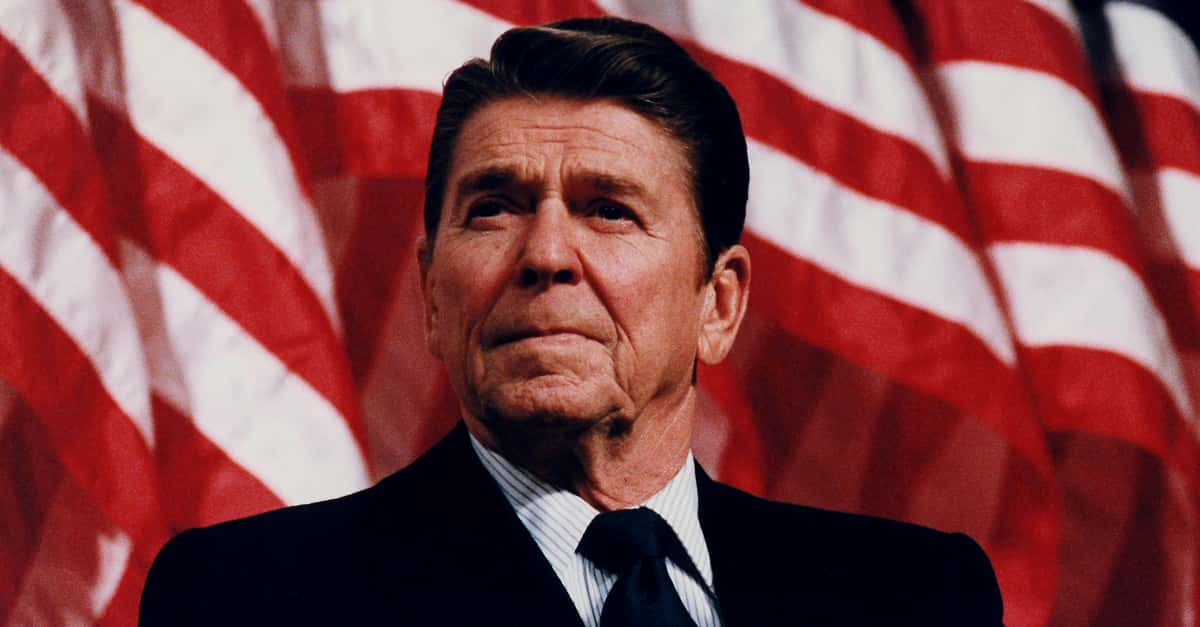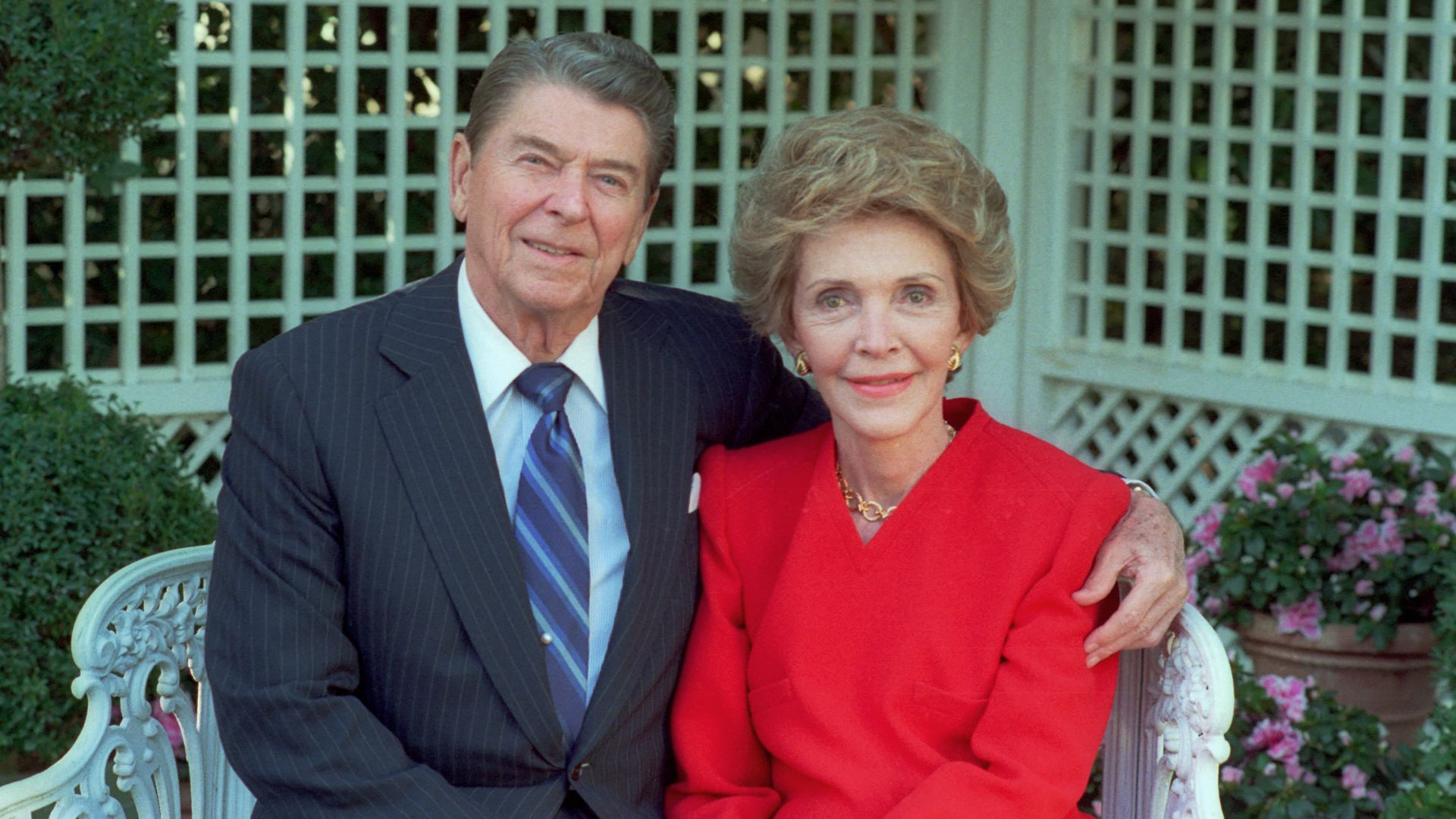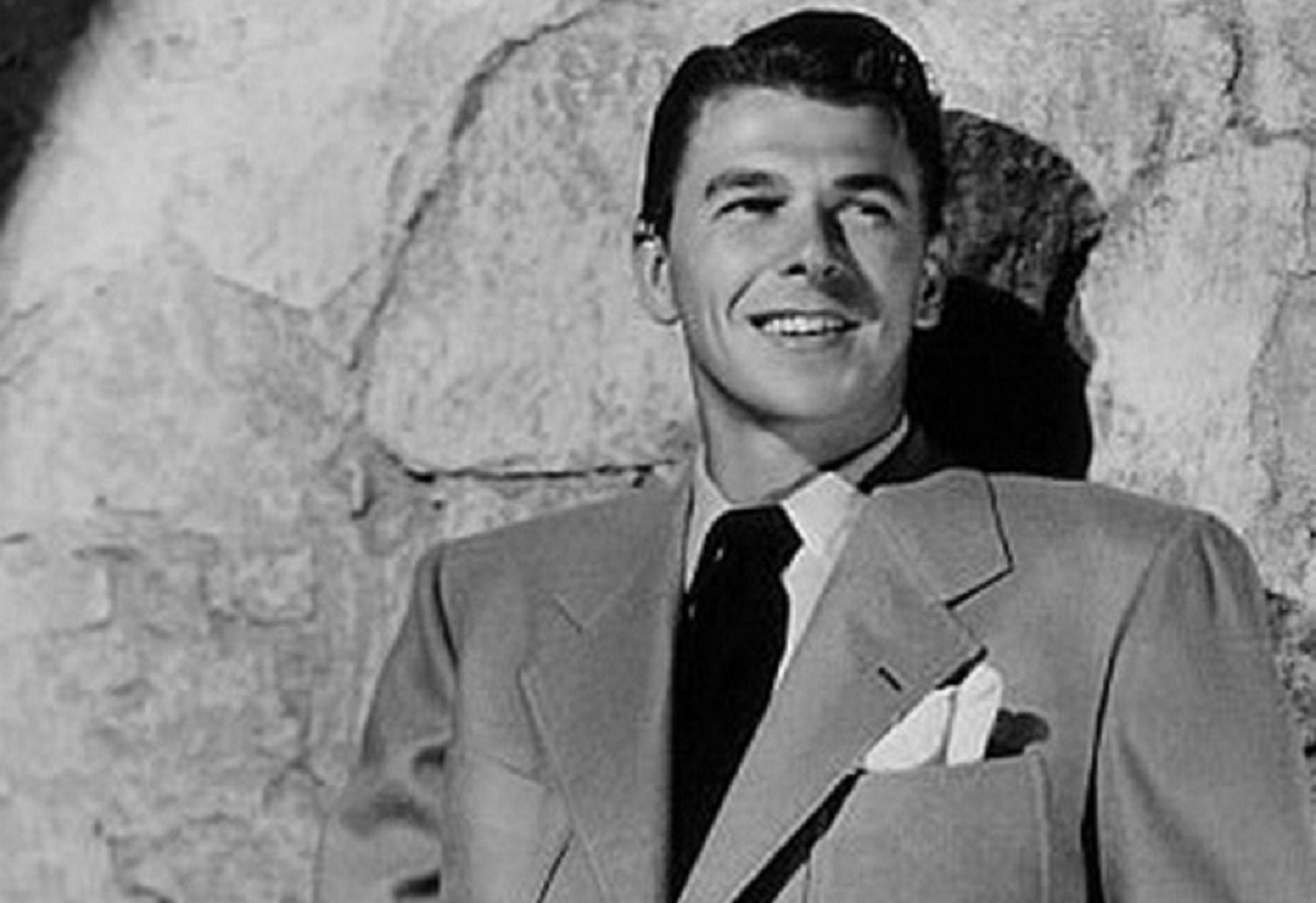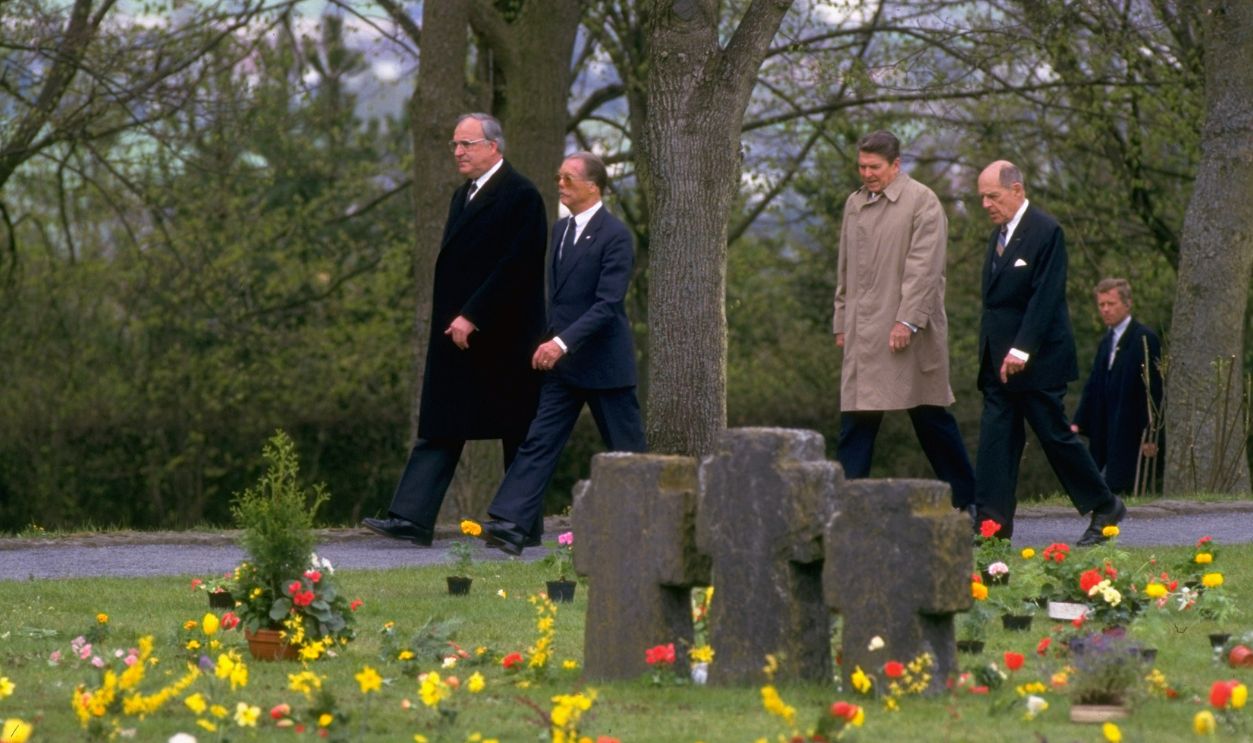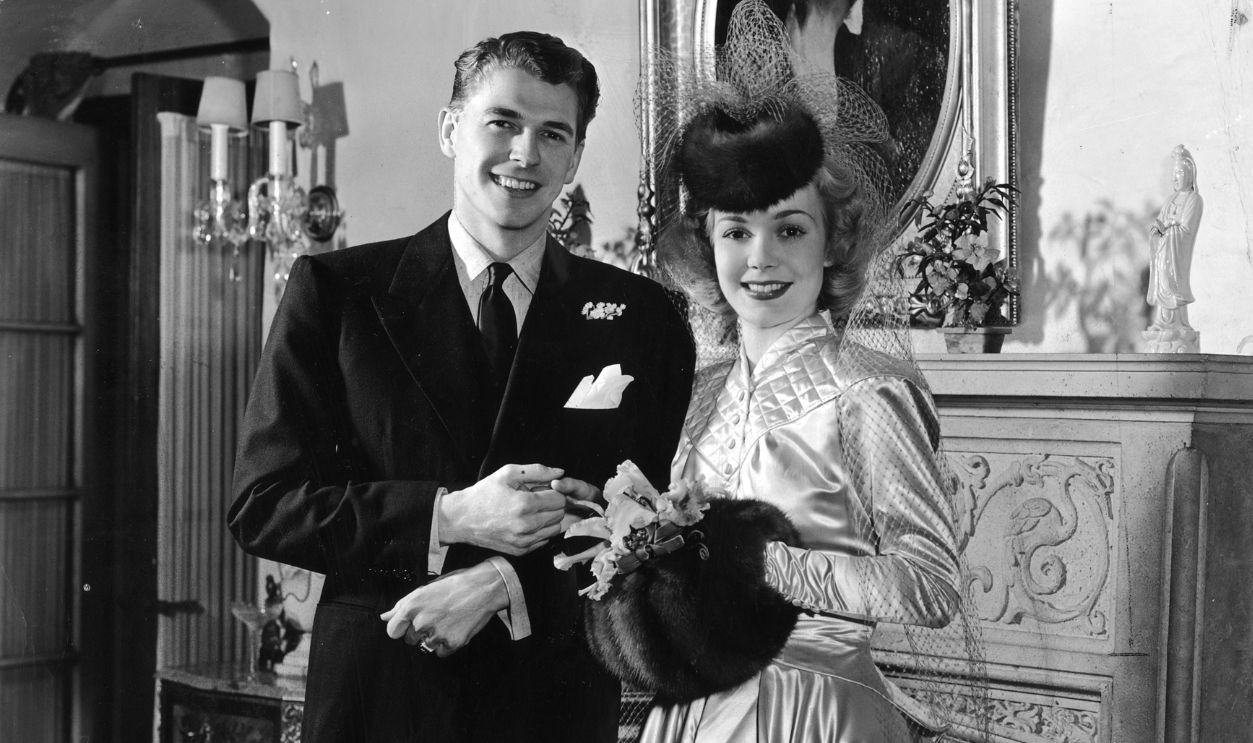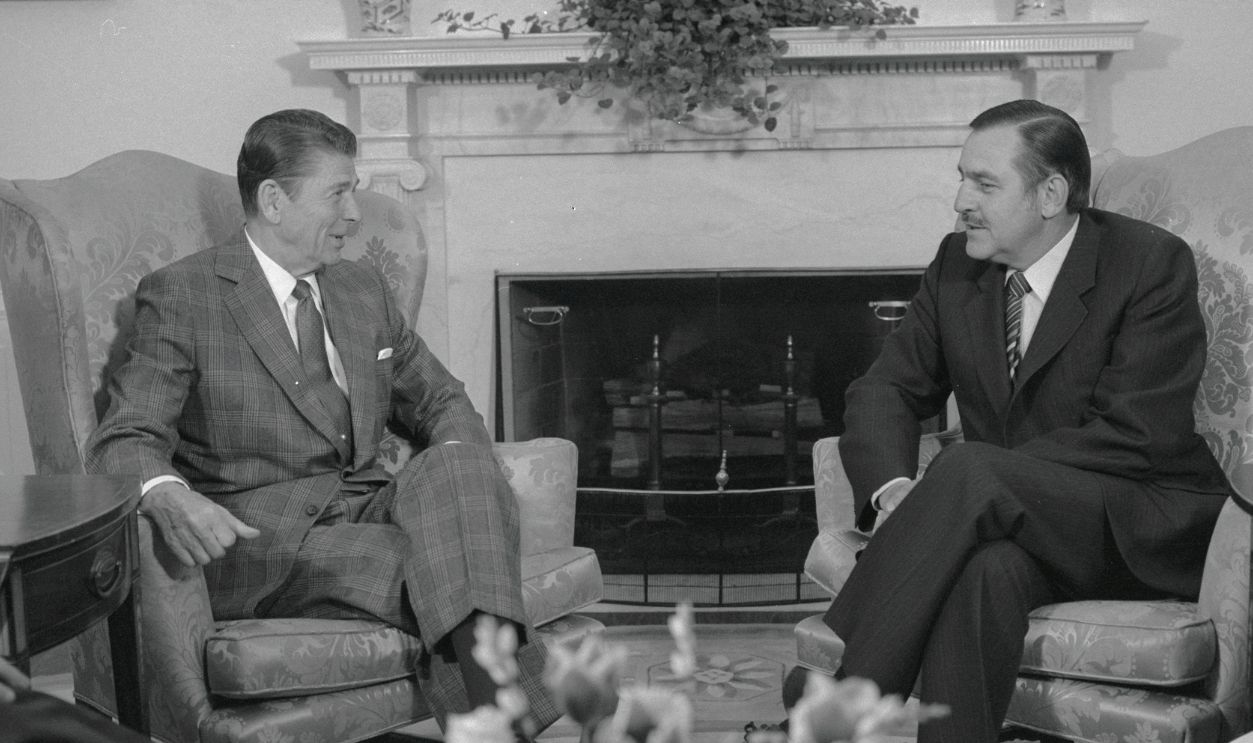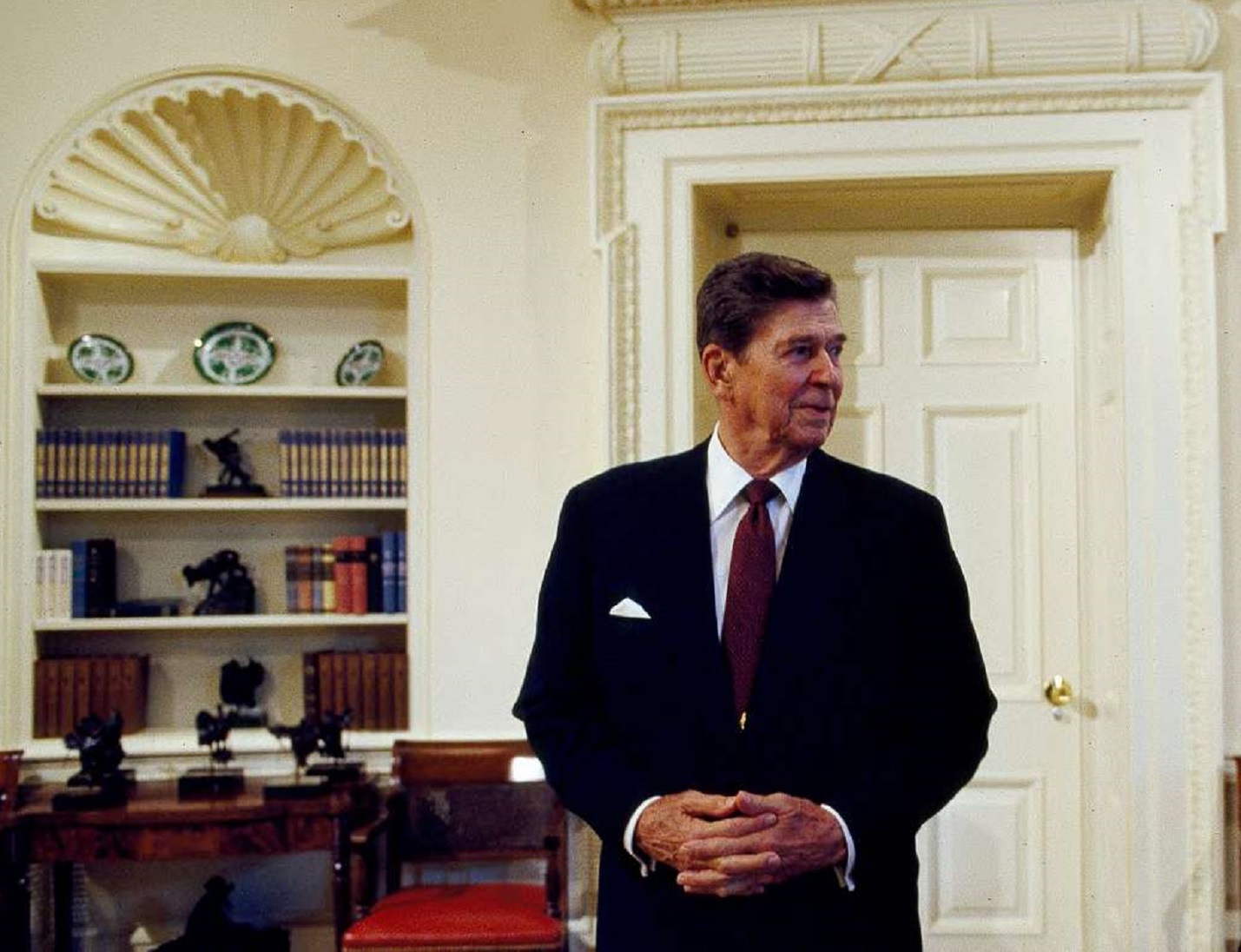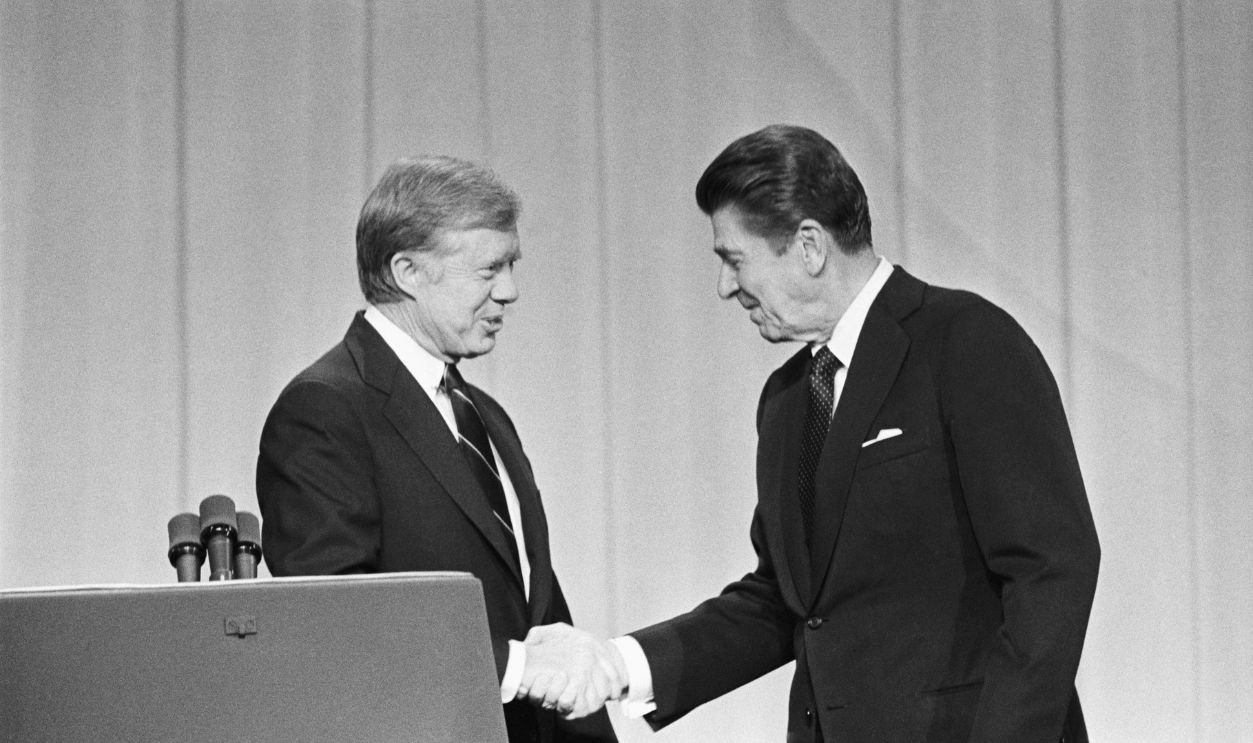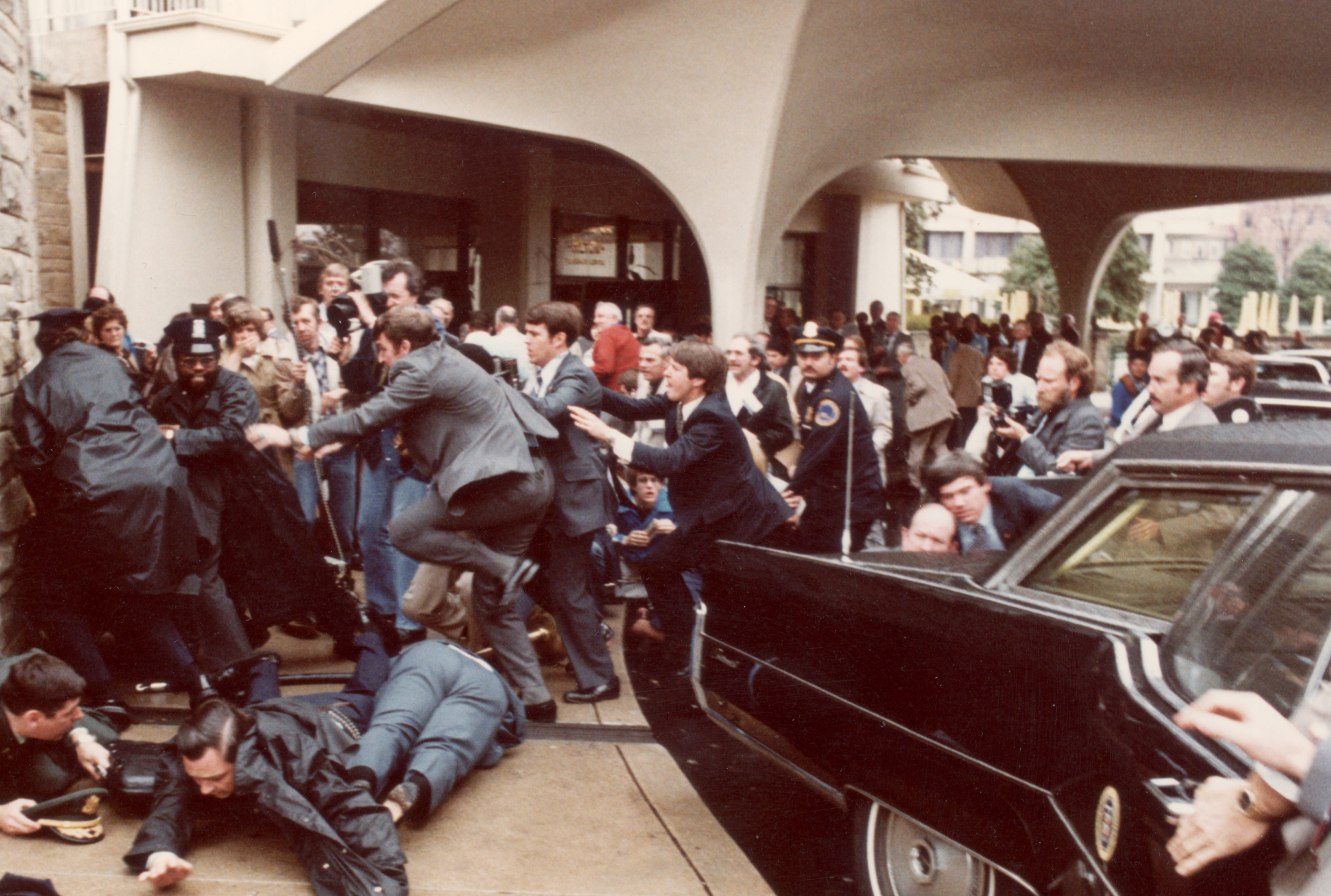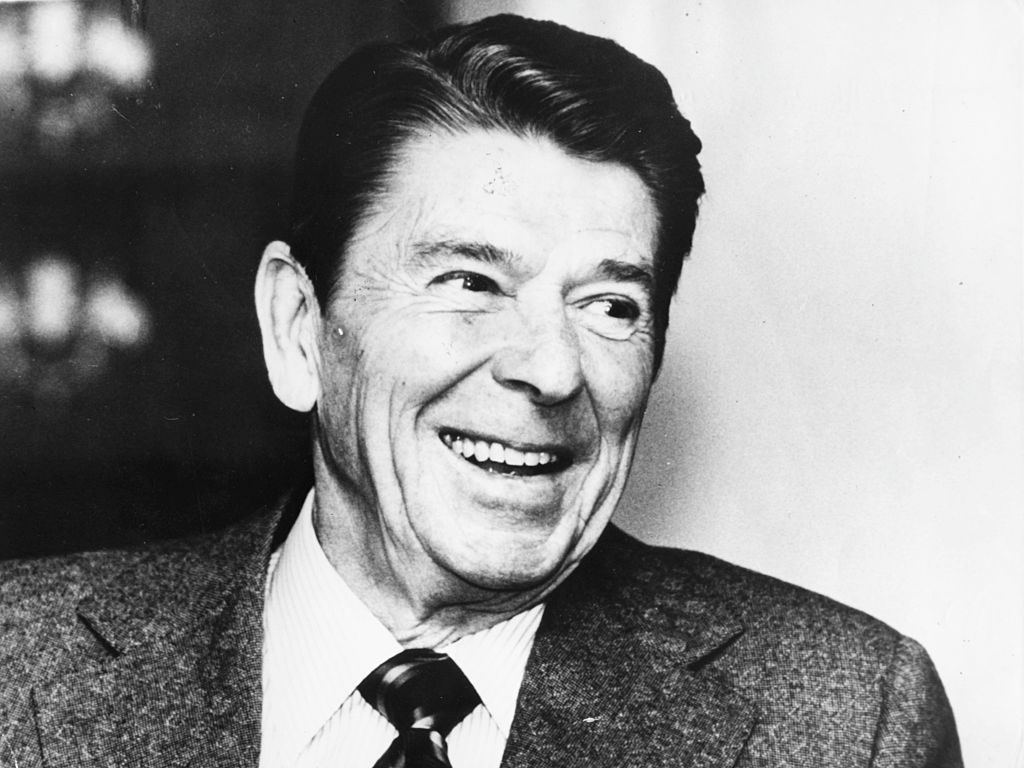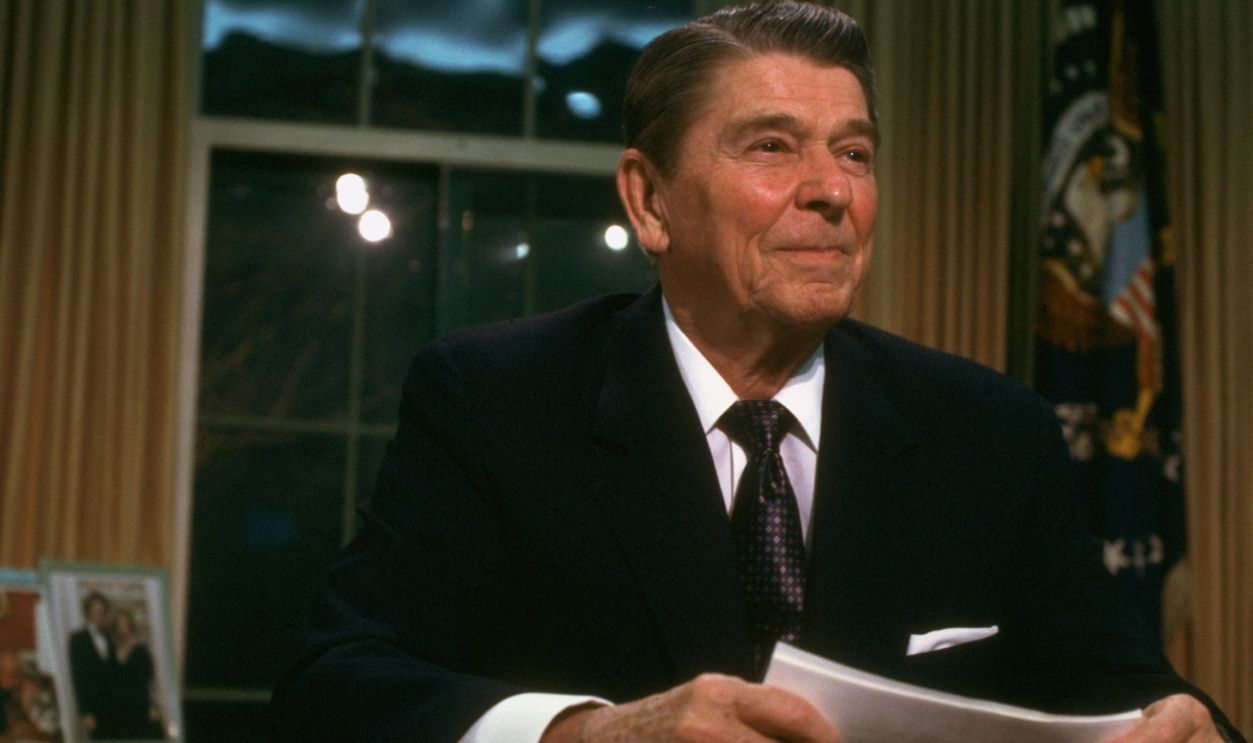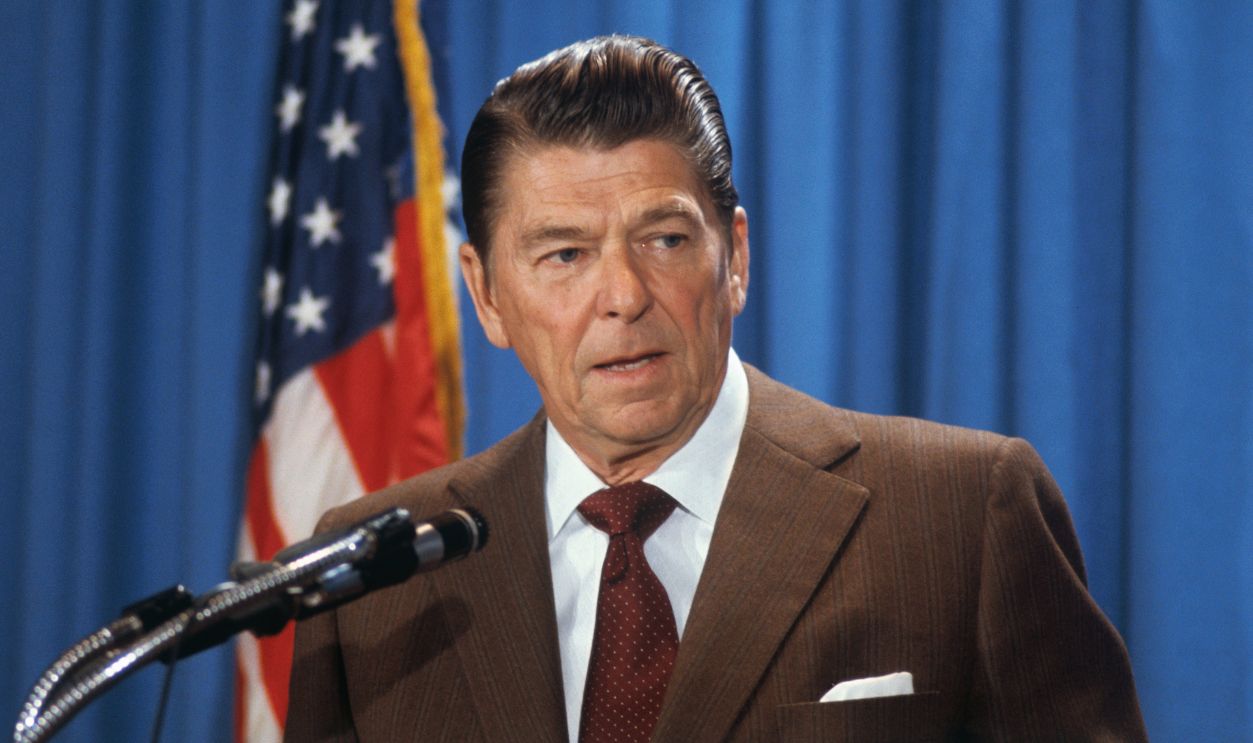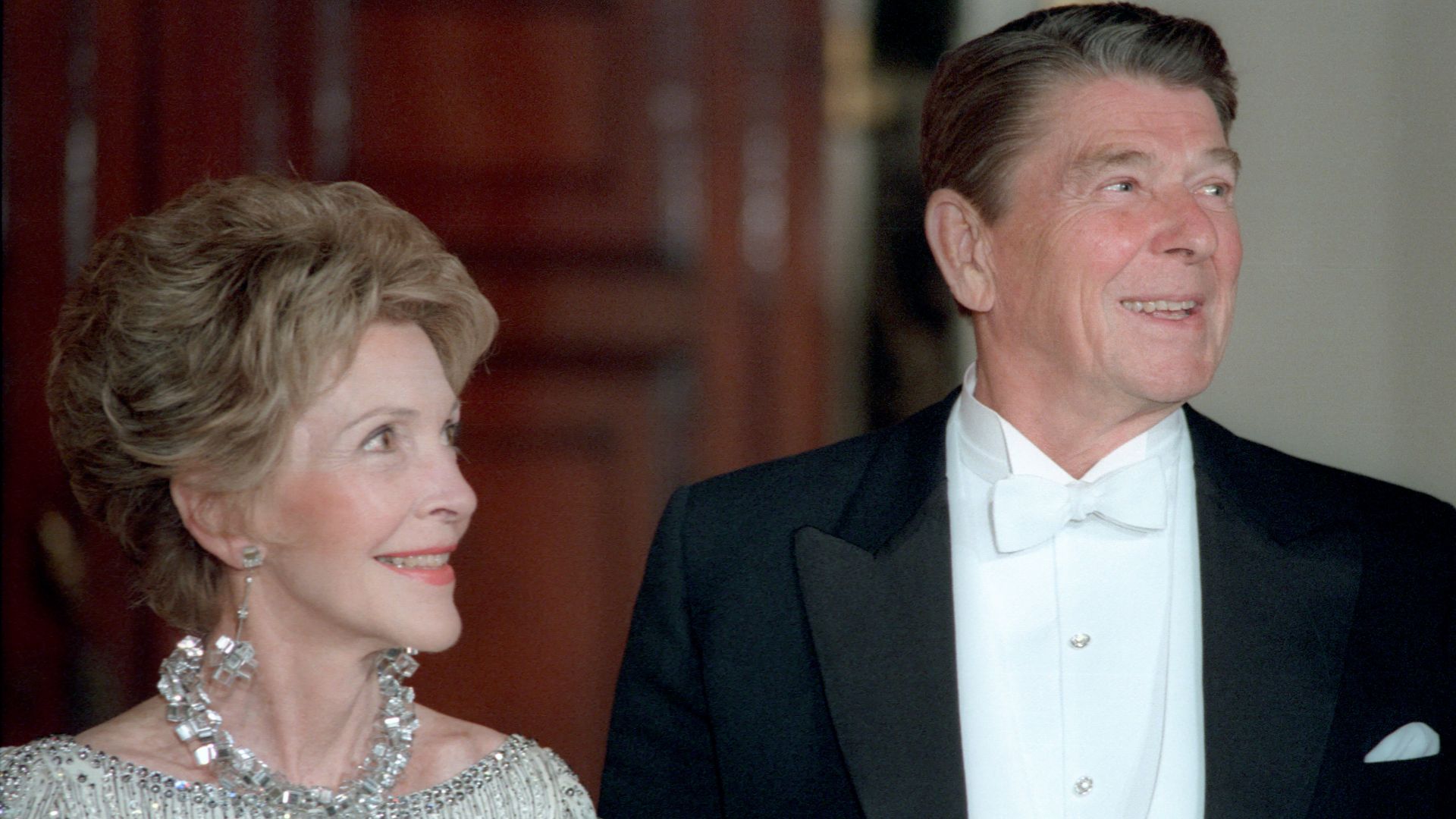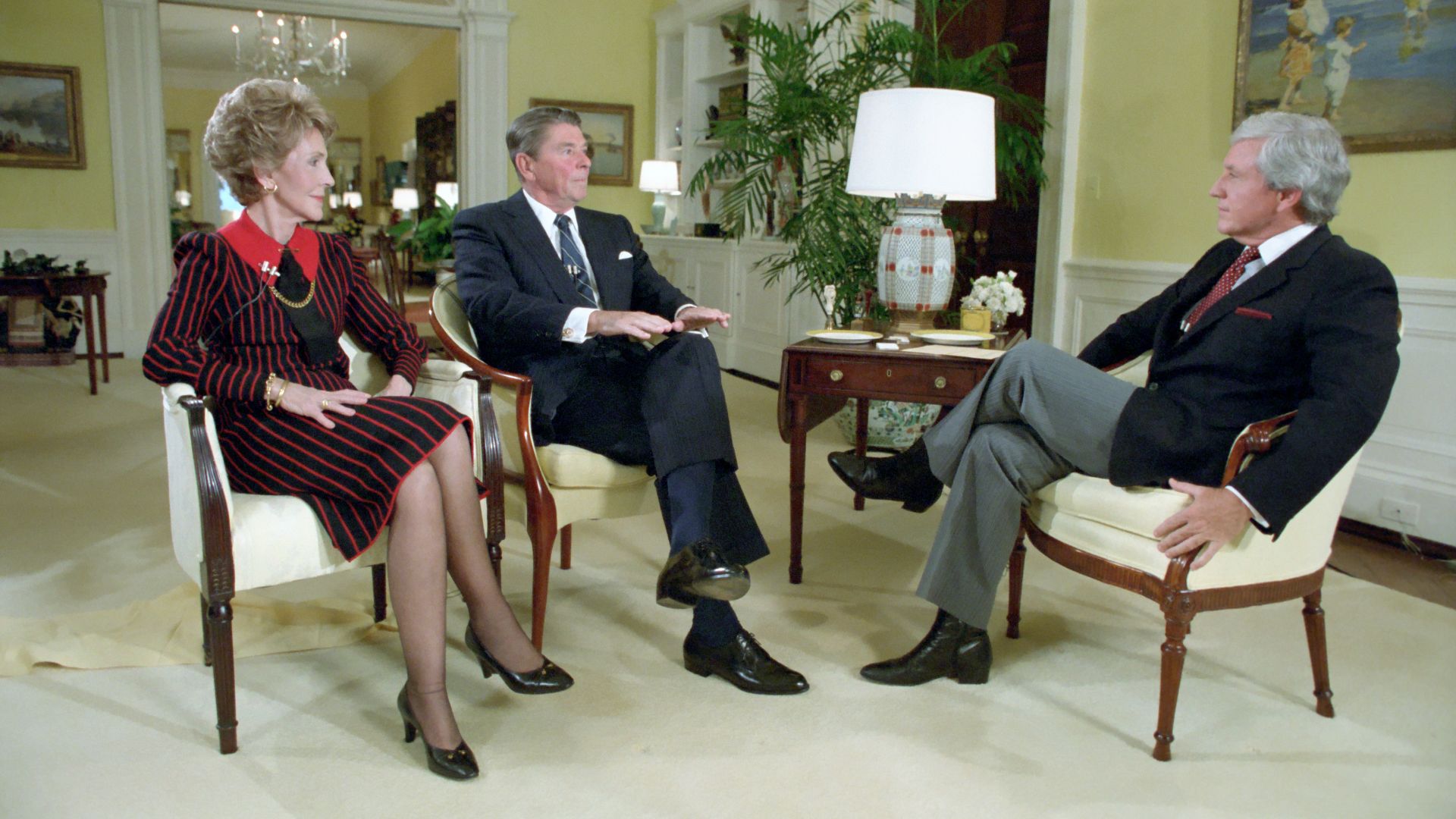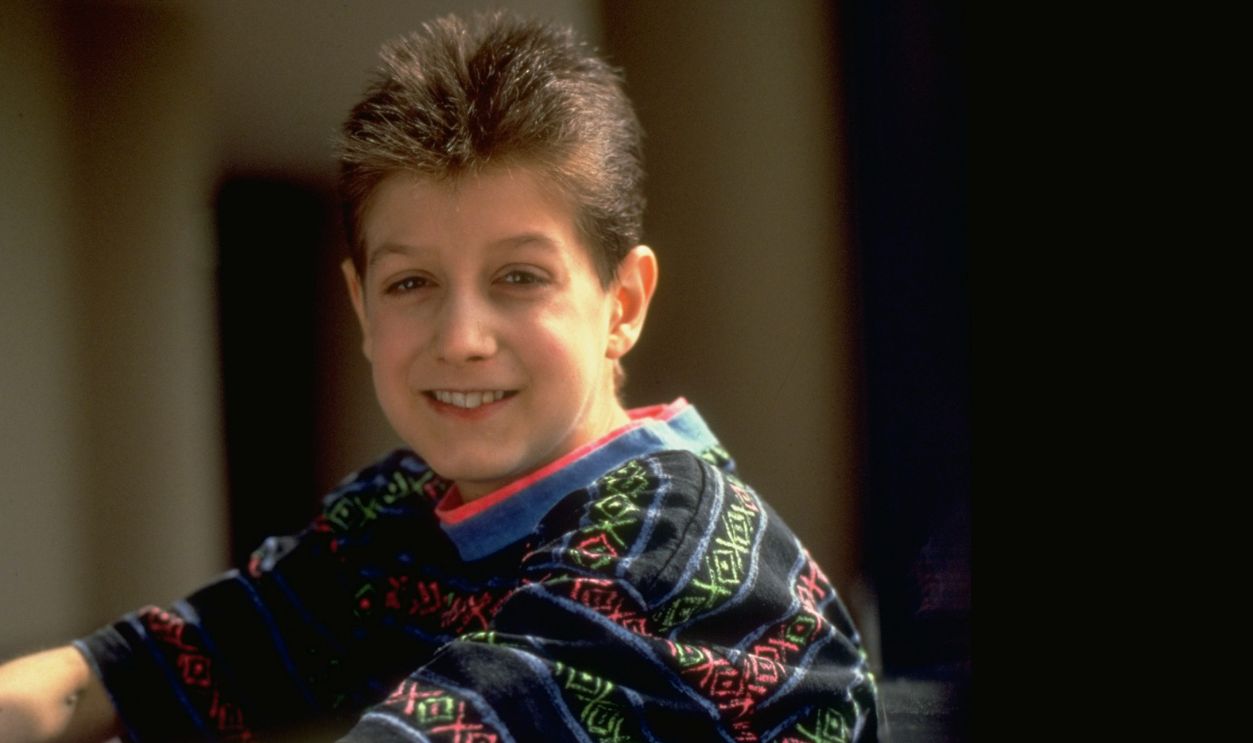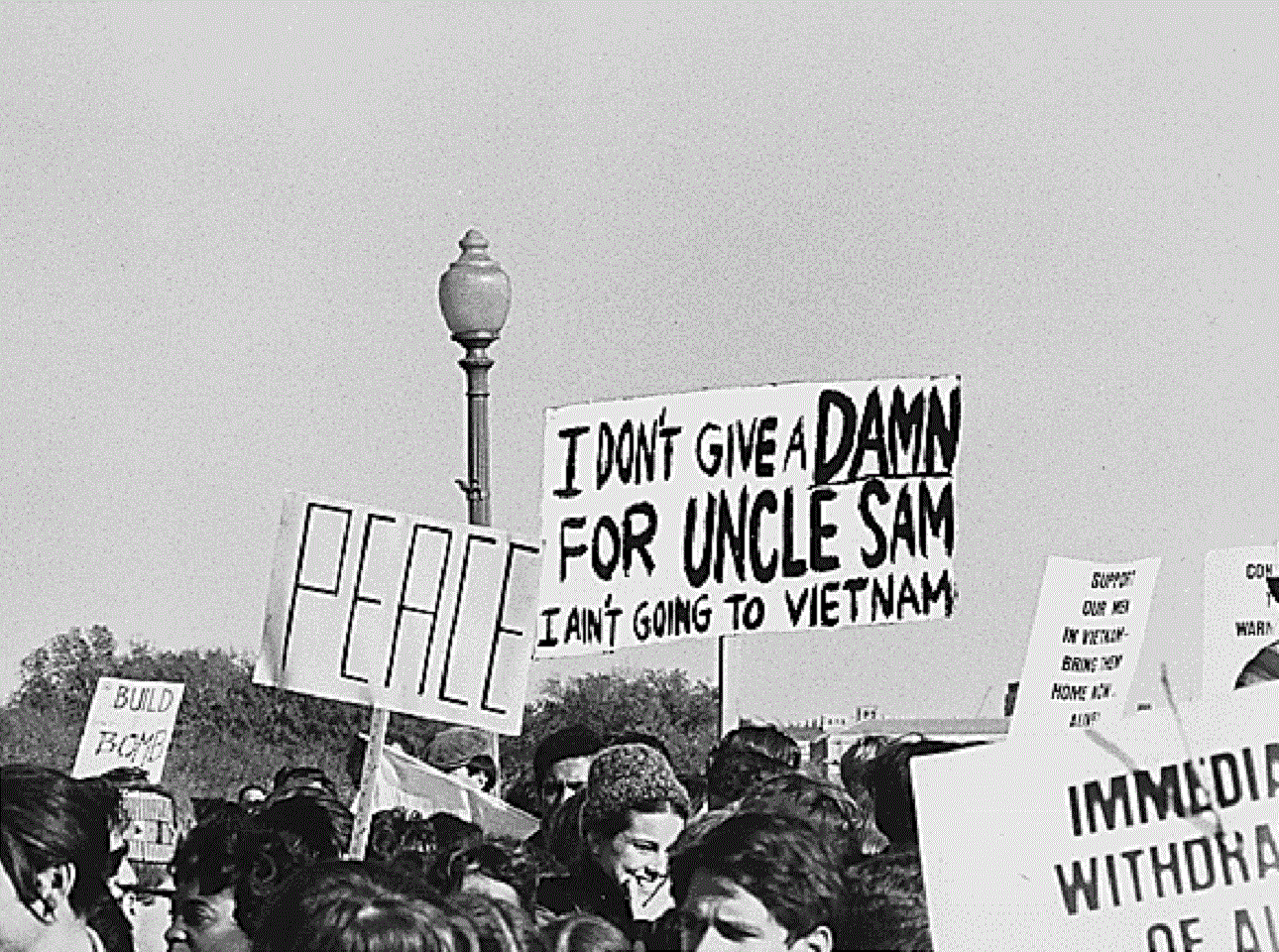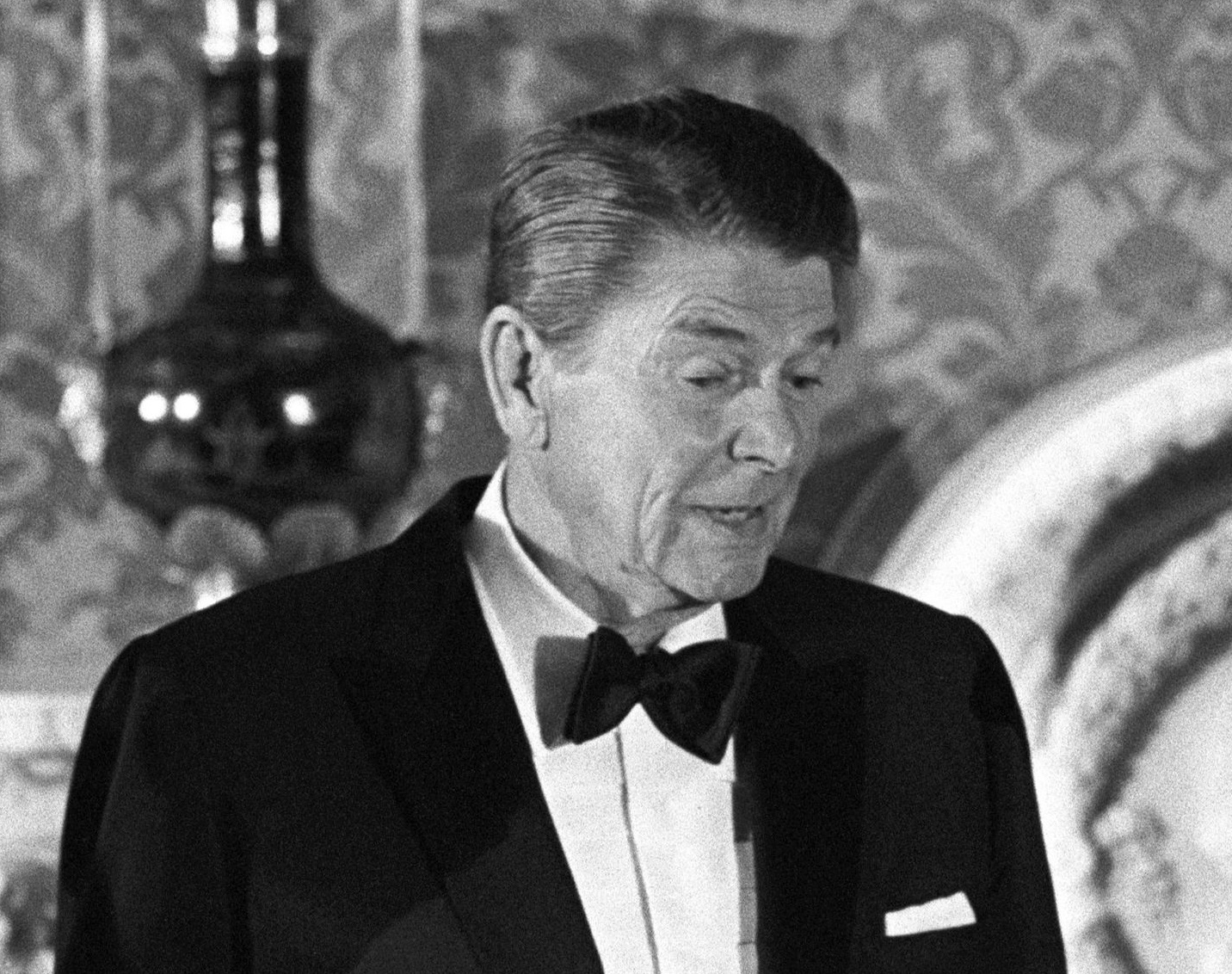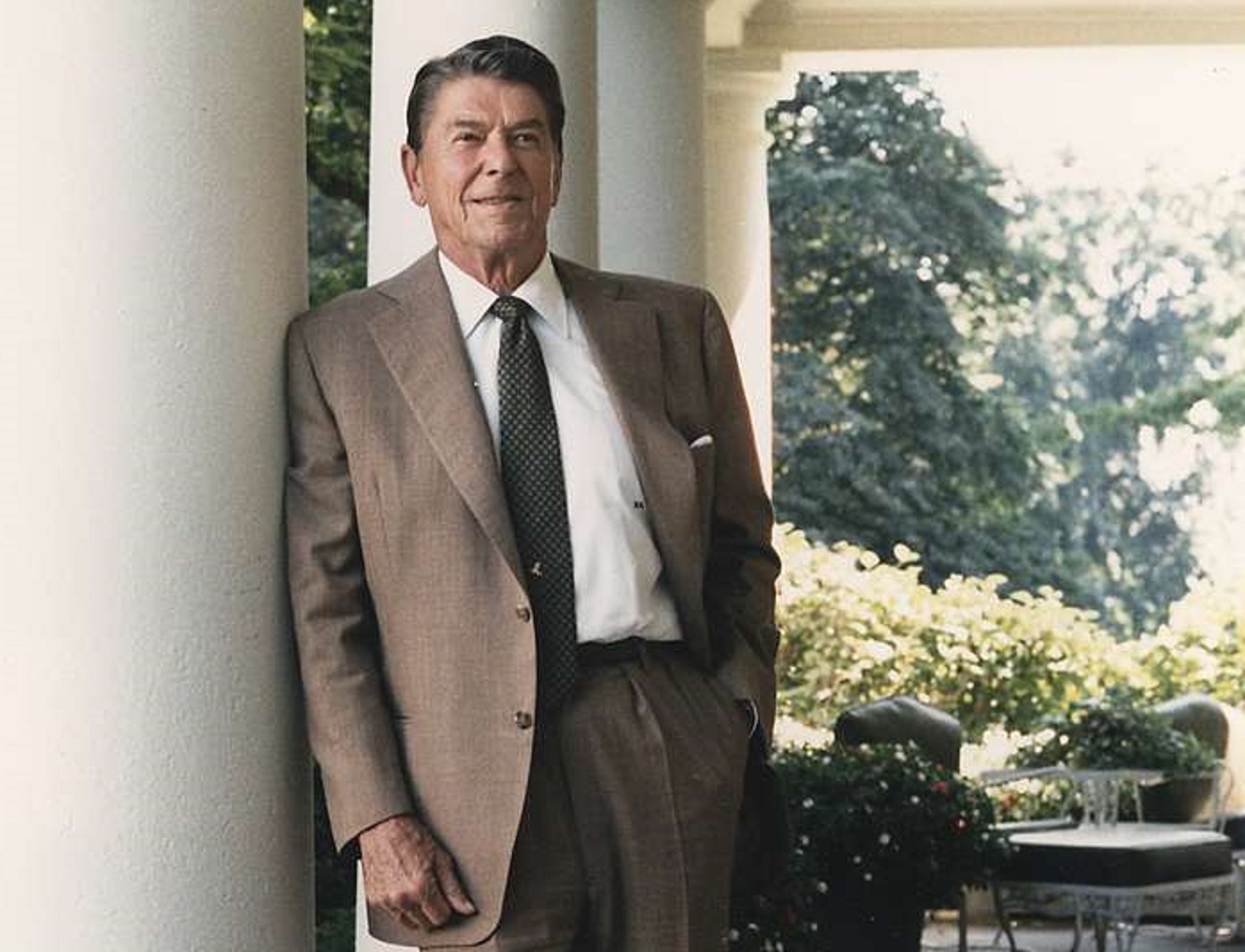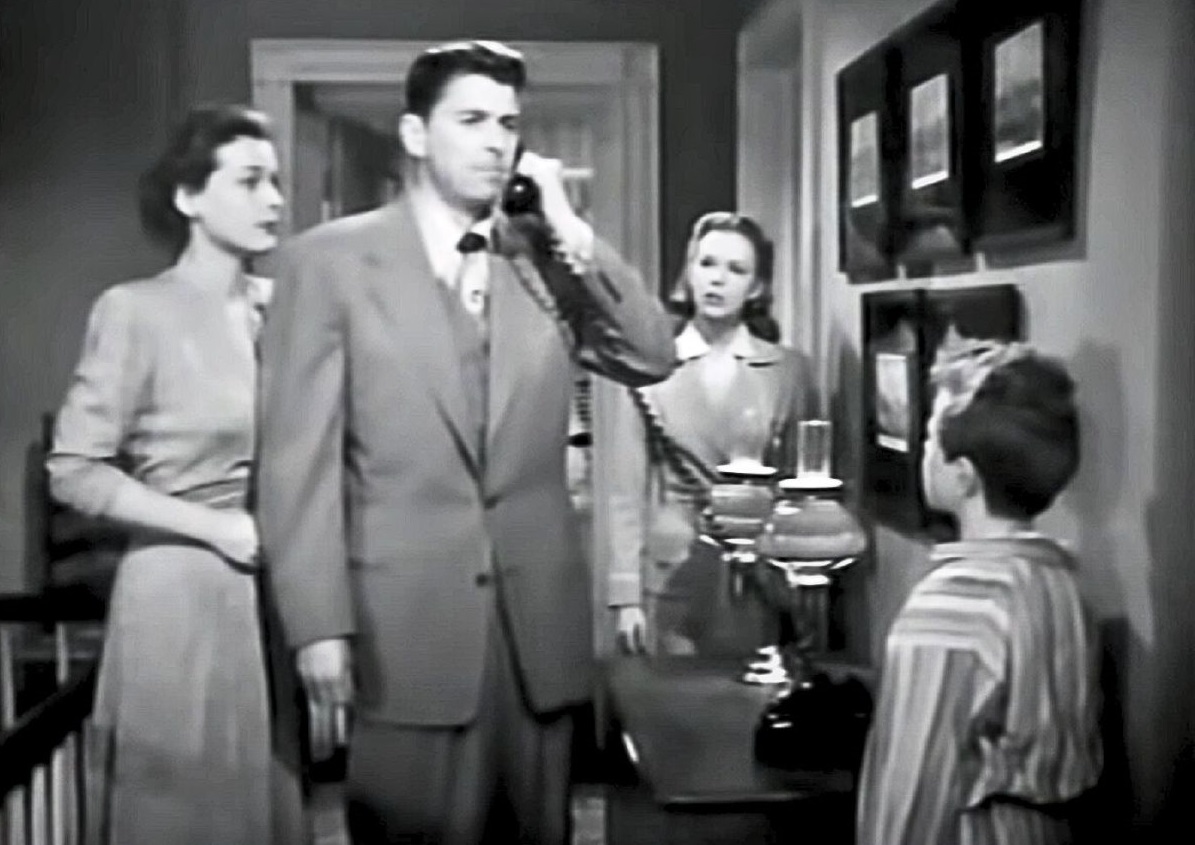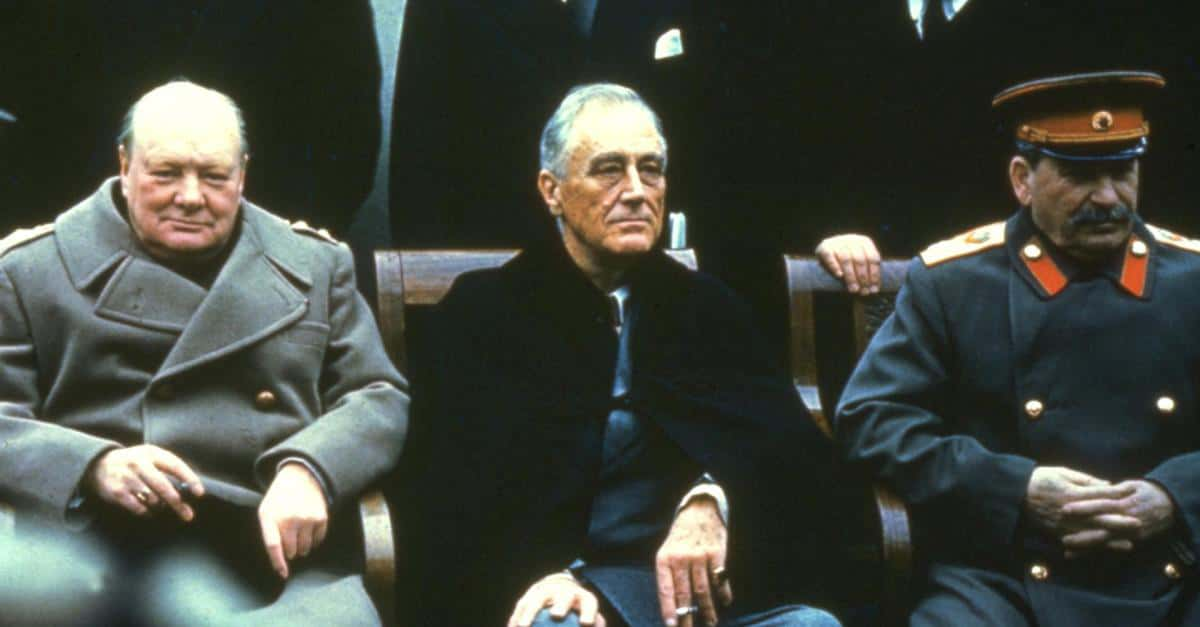As his vice president for eight years, I learned more from Ronald Reagan than from anyone I encountered in all my years of public life.
- George H.W. Bush
That's high praise from a President. Having a man who spent time as the Most Powerful Person on the Planet™ call you their greatest teacher is basically as good as it gets.
But is it any surprise? President Ronald Reagan has gained a shining reputation amongst millions of Americans. He presided over most of the ‘80s, which has been hailed ever since as a glorious time in American history. He even earned himself a pretty distinguished nickname: The Great Communicator, for his unmatched ability to blend down-home folksy plain-spokenness with presidential wit and wisdom.
But was Reagan's time in office really all that glorious? Was the man as great of a president as so many people believe? Read these underreported facts about Ronald Reagan and decide for yourselves.
Ronald Reagan Facts
1. Win One For the Gipper
When he was growing up, Reagan was given the nicknames Ronnie and Dutch, for his Dutch boy haircut. But it was during his time in Hollywood that he got his most well-known nickname, Gipper. He appeared as the football player George Gipp in the film Knute Rockne, All American. The character delivers the famous “Win just one for the Gipper” line while on his deathbed.
And let's just all get it out of the way now: the man was downright handsome. Agree with his policies or not, but that fact is indisputable.
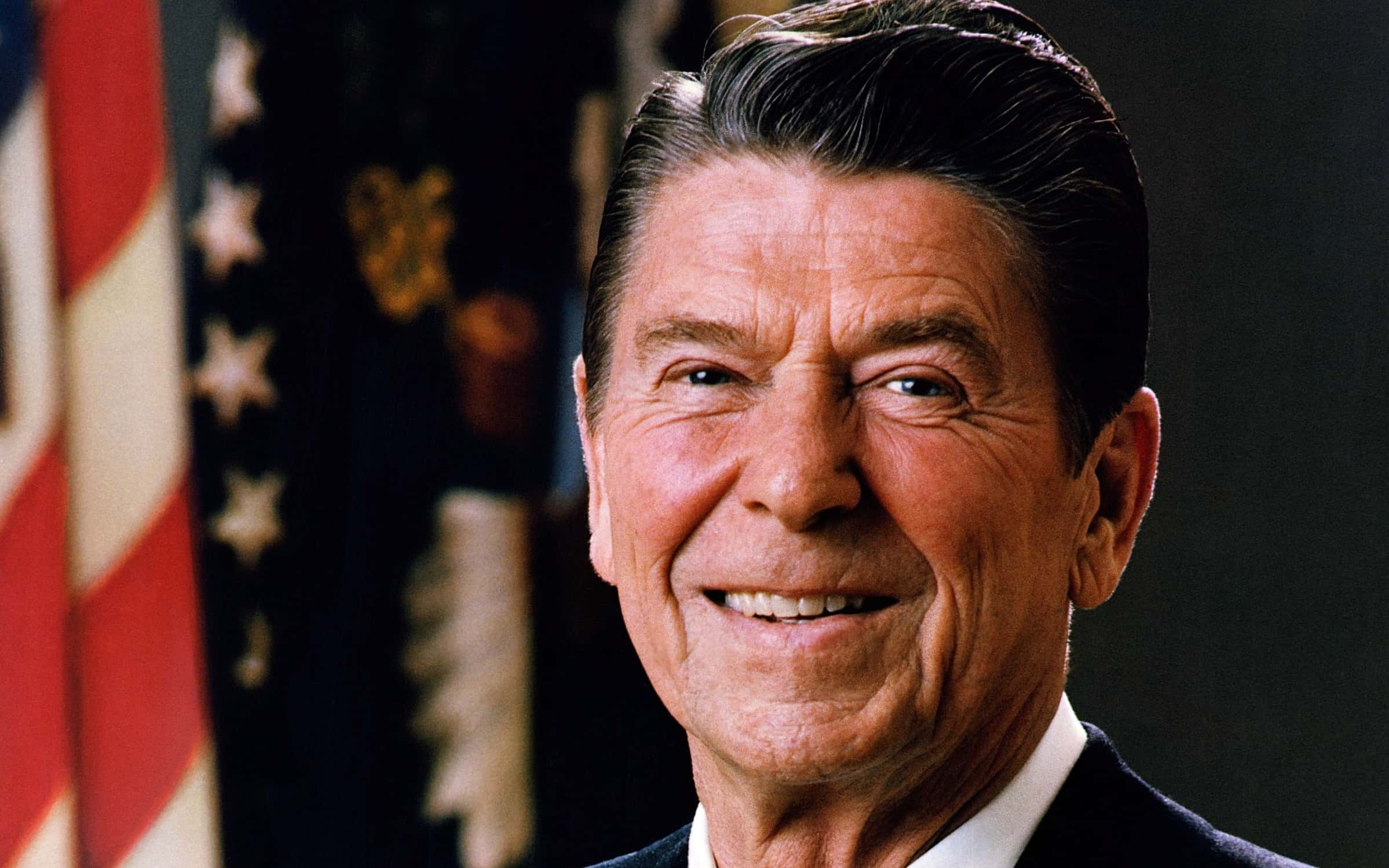 Michael Evans, Wikimedia Commons
Michael Evans, Wikimedia Commons
2. What’s the Sign Say?
Reagan and his wife were fervent astrologists, and they actually made significant life decisions based on whether the signs were right. As governor of California, Reagan made sure that he took his oath of office at 12:10 AM, because it synced up with a star alignment.
You have to imagine that whoever was in charge of his P.R. team was not exactly a fan of that move. For a man called the Great Communicator, that's not the smartest message to be sending. "Thank you for electing me, America. By the way, have you read your horoscopes today?"
3. Hollywood Calls
Ronald Reagan was the first actor to become President of the US. During his time in Hollywood, he was signed to a contract with Warner Brothers and appeared mostly in B-movies—over 53 by the time all was said and done!
And this is at a time when a celebrity reaching powerful political office was considered to be a little surprising. Ohhhh, the past: what a naive time. I'm sure when Arnold Schwarzenegger first took office, he gave a silent prayer of thanks to the man who helped pave the way.
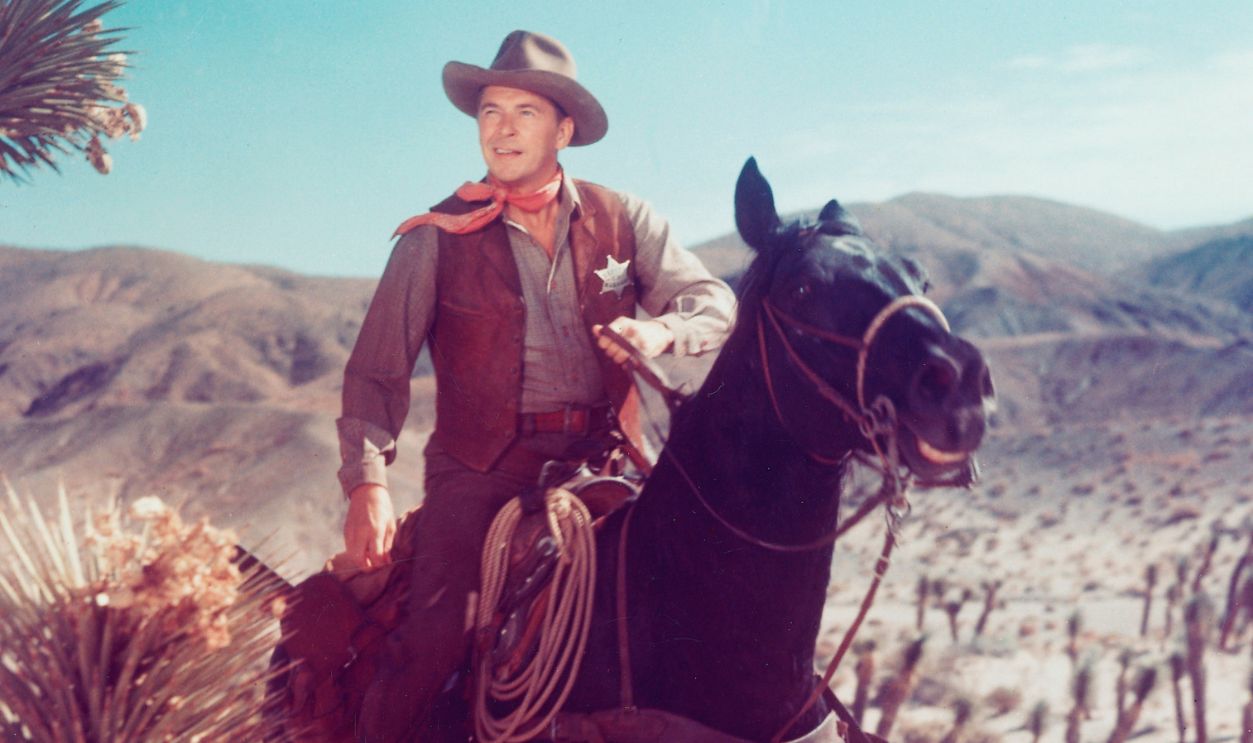 Silver Screen Collection, Getty Images
Silver Screen Collection, Getty Images
4. With Age Comes Wisdom
Up until recently, Ronald Reagan was the oldest elected President in the history of the United States. He was about to turn 70 when he was inaugurated in 1981.
 Reagan White House Photographs, Wikimedia Commons
Reagan White House Photographs, Wikimedia Commons
5. Ironic Beginnings
While Reagan has become known as a bastion of conservative leadership in the history of the US, he was originally far more inclined towards the left. His big break in terms of leadership came when he joined the Screen Actors Guild, a union designed to look after actors in the entertainment industry. In fact, after Reagan became president of the union, he organized the first industrywide strike in the history of the Hollywood when they ignored the requests of SAG. Of course, the strike was settled in such an obviously one-sided agreement that Reagan’s peers, including Bob Hope and Mickey Rooney, nicknamed it “the Great Giveaway.”
6. He had a Great Interview…
In 1986, the FBI launched a 3-year investigation when they received hints that private defence contractors, working alongside US government and military officials, were guilty of corruption. The investigation led to several convictions, including the Reagan-appointed Assistant Secretary of the US Navy, Melvyn Paisley. Paisley was found guilty of accepting hundreds of thousands of dollars in bribes, receiving four years in prison for his efforts.
 James P. Vineyard, Wikimedia Commons
James P. Vineyard, Wikimedia Commons
7. Fowl Play
The tradition of pardoning the Thanksgiving turkey at the White House is one which truly began under Reagan, but not for the reason you would think. In 1987, the White House was caught up in the Iran-Contra scandal with Oliver North and John Poindexter on trial. The word was that Reagan was going to issue pardons for them, and so on Thanksgiving, the president was asked by a reporter if he would issue a Thanksgiving pardon. Reagan turned the question into a joke by pointing at the turkey and declaring that he would be receiving the pardon. George H.W. Bush continued the tradition, as did every president after him.
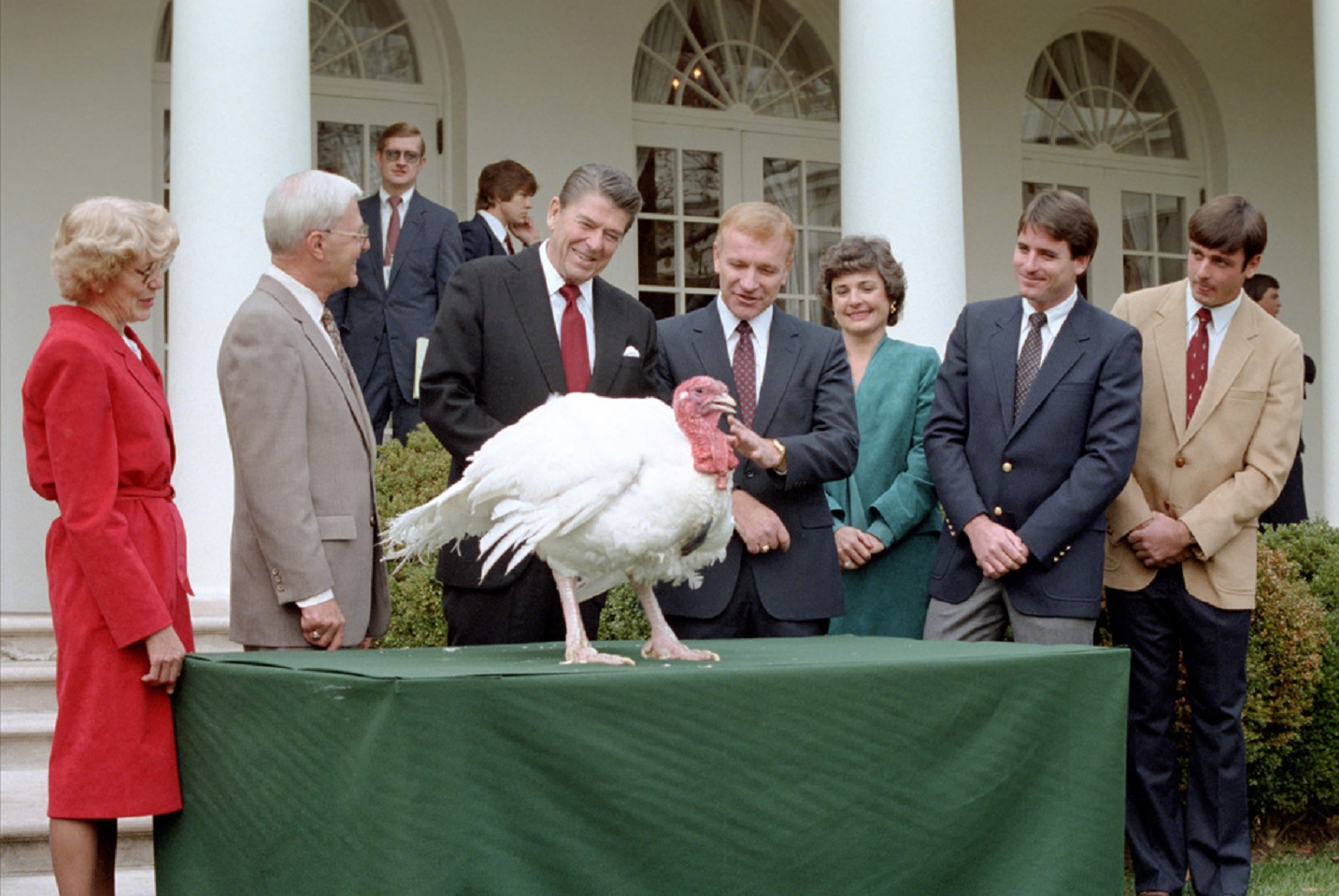 The U.S. National Archives, Picryl
The U.S. National Archives, Picryl
8. Choose Your Friends More Carefully
In 1982, Reagan met with Efrain Rios Montt, the president of Guatemala. Reagan complained that Montt had an unfairly negative reputation, stating that he knew Montt was “a man of great personal integrity," ignoring the fact that Montt was only president because he’d taken the job in a coup.
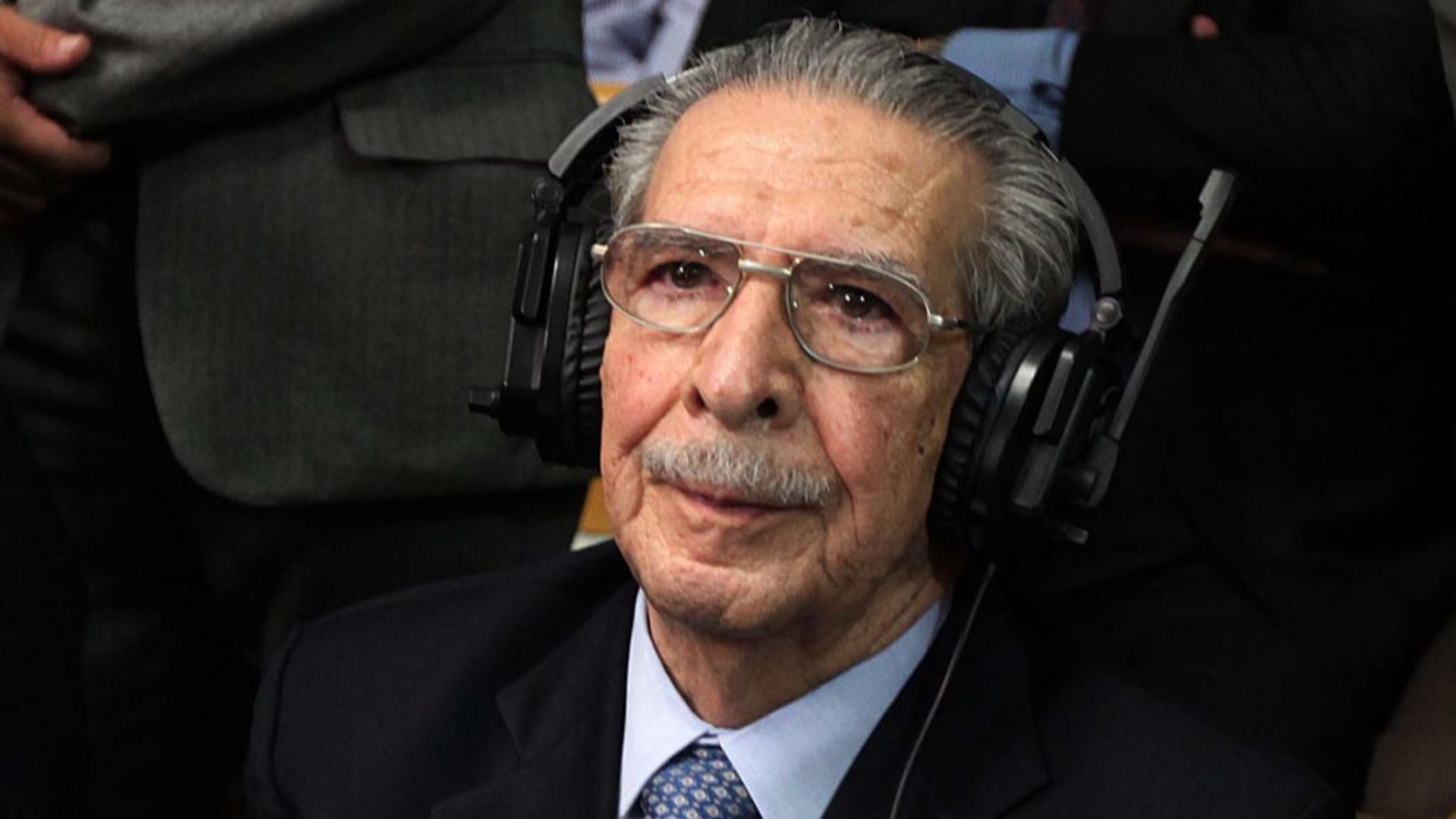 CARLOS SEBASTIAN, Wikimedia Commons
CARLOS SEBASTIAN, Wikimedia Commons
9. Slightly Skewed Vision, Sir
In 1985, Reagan traveled to the Bitburg cemetery in West Germany, and laid a wreath on the gravesite of Germans who had died fighting in WWII—for the Nazis and against American and other Allied soldiers. Second World War veterans and Holocaust survivors such as Nobel Peace Prize winner Elie Wiesel, protested loudly at this respect paid to men who had fought to preserve an institution which had slaughtered millions. Reagan, however, argued that the German soldiers were themselves victims of Nazi Germany.

History's most fascinating stories and darkest secrets, delivered to your inbox daily.
10. Workaholic
Reagan’s first divorce occurred during his time as President of the SAG. He separated legally from the actress Jane Wyman.
In the divorce filings, his absorption with work was cited as one of the reasons for their separation. Ironically, he met his next wife, Nancy Davis, while working in the same position. She had mistakenly been listed on the communist blacklist, after a mix-up with another actress who had the same name.
At least, we hope it was a mistake. It would be a bad look for a man of Reagan's reputation to be married to a communist. Then again, they say opposites attract...
11. But I Have My Reasons!
It isn’t slander to say that Reagan’s record of racial equality could have been a lot better than it was. And yet, people sweep some of his actions under the rug, including his veto of the Comprehensive Anti-Apartheid Act. At the time, South Africa was in the middle of Apartheid, where the white minority held the black majority in thrall with violence and racism. Reagan was pressured not to do any business with the South African government while Apartheid was still active, but he vetoed the Act anyway and maintained a close relationship with South Africa. Reagan argued that he felt that if he tried to punish the South African government and hold them at arms length, the poor black population would feel the worst of the sting. While there’s merit to that argument, many others, including Bishop Desmond Tutu, have found flaws with just how closely the US worked with South Africa during this time.
12. Clean Air? Looks Clean to Me!
During his presidency, Jimmy Carter was concerned about the environment and renewable energy being used instead of coal and oil—given the oil crisis in the 1970s, his fears were well-founded economically as well. To do his own part, Carter had 32 solar panels installed on the White House, but the Reagans had them removed—not sure why, they weren’t doing any harm. The Obama administration put them back 29 years later, resulting in them producing energy equal to 1,725 pounds of coal within six years. With that kind of output, it’s been determined that those 29 years without 32 solar panels led to 200,000 pounds of CO2 being sent into the atmosphere. That’s equivalent to 500 barrels of oil, or 220,000 pounds of coal being burned up. Was it just because Carter had put them there?
 Reagan White House Photographs, Wikimedia Commons
Reagan White House Photographs, Wikimedia Commons
13. Rejected!
Just before Jimmy Carter ceded the presidency to Reagan, he signed the Mental Health Systems Act. This act would ensure the continuation of the mental health centers program which the Carter administration had maintained. Continuing a trend of Reagan reversing Carter’s decisions, he discarded the act and never showed any noted interest in pursuing research into dealing with mental health. Fighting the stigma of mental health concerns was not a priority, apparently.
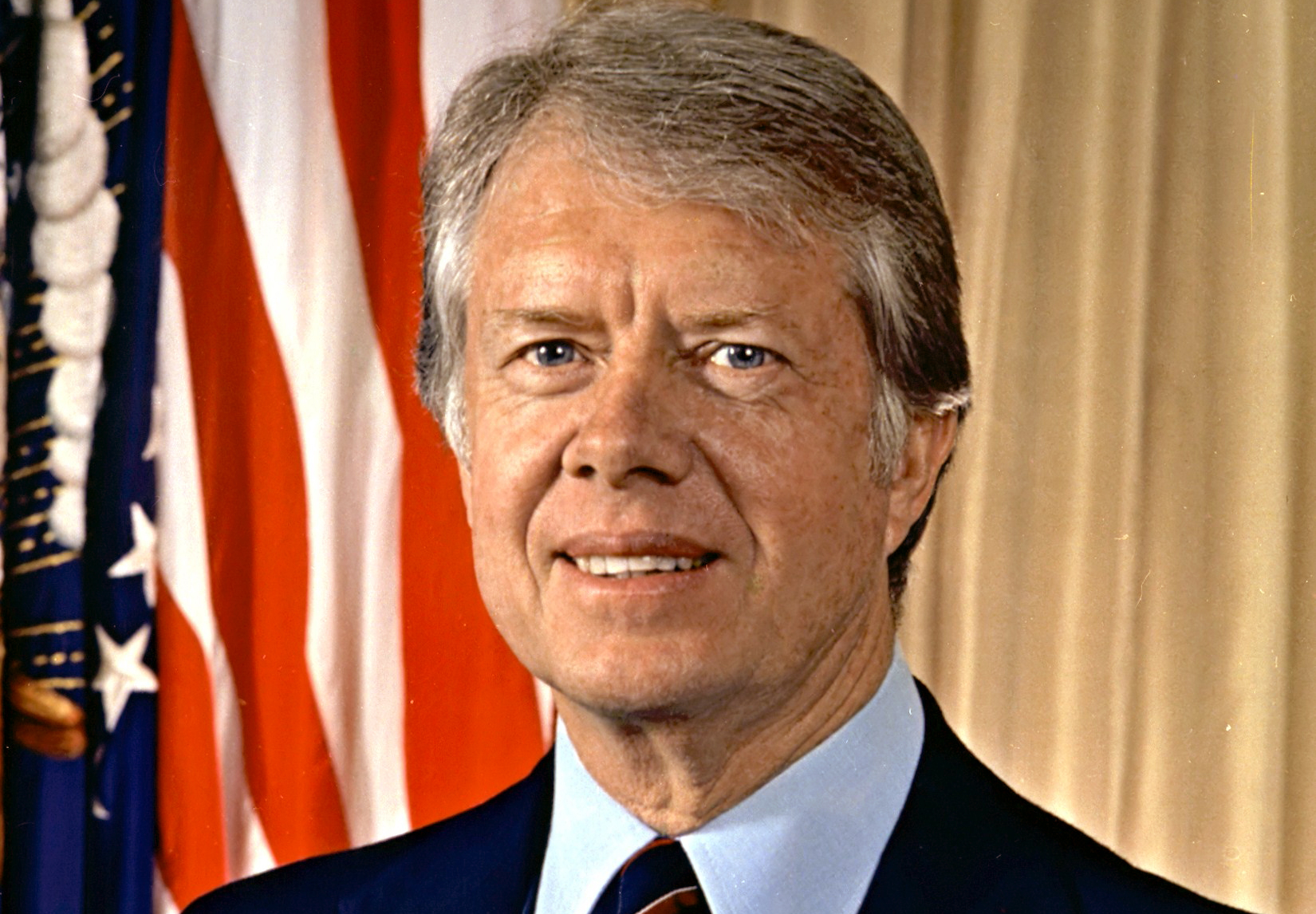 Department of Defense, Wikimedia Commons
Department of Defense, Wikimedia Commons
14. Who Cares If They Get Better?
The deinstitutionalization of state hospital patients did not begin with Reagan at all, but it’s worth pointing out that Reagan did nothing to reverse this trend. As a result, there arose a business around board-and-care homes which took in thousands of ex-state hospital patients. For-profit chains owned many of these homes, and even the ones that weren’t saw the homes “solely as a business, squeezing excessive profits out of it at the expense of residents.” Of the owners of these board-and-care home chains, at least one of them had a board whose members were connected directly or indirectly to Governor Reagan.
 Ronald Reagan Presidential Library, Wikimedia Commons
Ronald Reagan Presidential Library, Wikimedia Commons
15. An Enduring Myth
While the term originated in the ‘70s, the Reagan administration often made use of the "welfare queen" stereotype to justify their slashing of welfare programs and domestic systems meant to assist the poor. However, the number of people exploiting the welfare system was only ever a very small minority of people.
16. Against the Grain
During his time as Governor of California, Reagan was greatly frustrated by the Supreme Court of California’s decision to invalidate all death sentences before 1972. Reagan was a huge supporter of the death penalty, but he only issued one death sentence, for Aaron Mitchell, who was executed in San Quentin’s gas chamber in 1967.
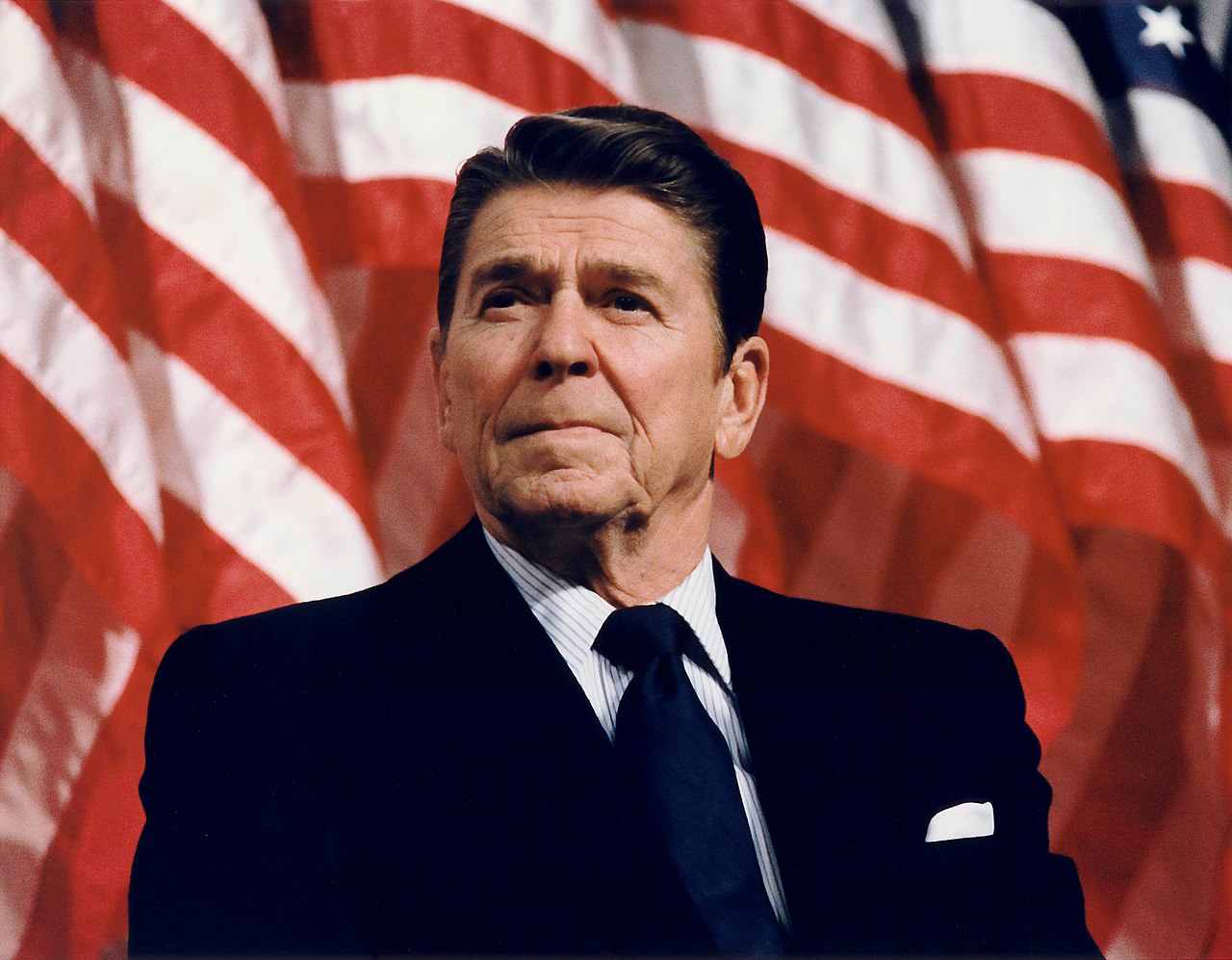 Michael Evans, Wikimedia Commons
Michael Evans, Wikimedia Commons
17. Cheaters Prosper
As some people might remember, the debate between Ronald Reagan and Jimmy Carter for the 1980 election changed the situation from a fairly even race to a Roman triumph for Reagan. He had a quip for every one of Carter’s debating points and arguments. The beleaguered incumbent president would have been a bit less baffled by Reagan’s incredible performance if he’d known that a copy of his papers had found its way into the hands of Reagan and his team. Reagan had practised his performance solely on what Carter would say. The subsequent debate led to Reagan wiping the floor with Carter, while Carter spent the rest of his life rebuilding his reputation by becoming a full-time humanitarian.
18. The Assassination Attempt
Long after he’d left the film world, Reagan found himself back in the middle of a Hollywood drama during an assassination attempt in 1981. After appearing in Martin Scorsese’s Taxi Driver, Jodie Foster attracted the attention of of John Hinckley Jr., who developed an obsession with the talented actor and began stalking her when she was a freshman at Yale. In 1981, Hinckley attempted to assassinate President Ronald Reagan to get her attention. Reagan survived the attempt, saying to his wife afterward, “Honey, I forgot to duck.”
19. Diverting His Talents
Reagan was an Army reservist and had been at the top of his career when WWII broke out, but he put his career on hold to serve. He looked forward to joining the Allied forces in Europe but was never sent overseas due to his poor eyesight. Luckily for him, there was the First Motion Picture Unit, which produced training films for the Air Force. He helped film or produce over 400 films throughout the war, putting his talents to good use.
 Reagan White House Photographs, Wikimedia Commons
Reagan White House Photographs, Wikimedia Commons
20. Deep End All the Way!
While running for president, Reagan promised to support unions’ abilities to negotiate with employers on behalf of the workers. This gained him the support of the Professional Air Traffic Controllers Organization (PATCO). Later, serious issues caused around 13,000 government-employed air traffic controllers to go on strike, even though it was forbidden for government employees to do so. Reagan reacted by firing those thousands who had marched off the job, ignoring the bad press it caused to turn on the very people who’d helped get him elected and ignoring the huge hassle it became to hire and train thousands of replacements overnight.
 Unknown photographer, Wikimedia Commons
Unknown photographer, Wikimedia Commons
21. The Union Buster
Reagan’s mass firing of the PATCO employees and promptly replacing them set a nasty trend. Unions, which had once represented 40% of workers in the US, lost a lot of power over the years thanks to employers taking a leaf out of Reagan’s book when it came to breaking strikes. Today, they represent less than 7% of workers.
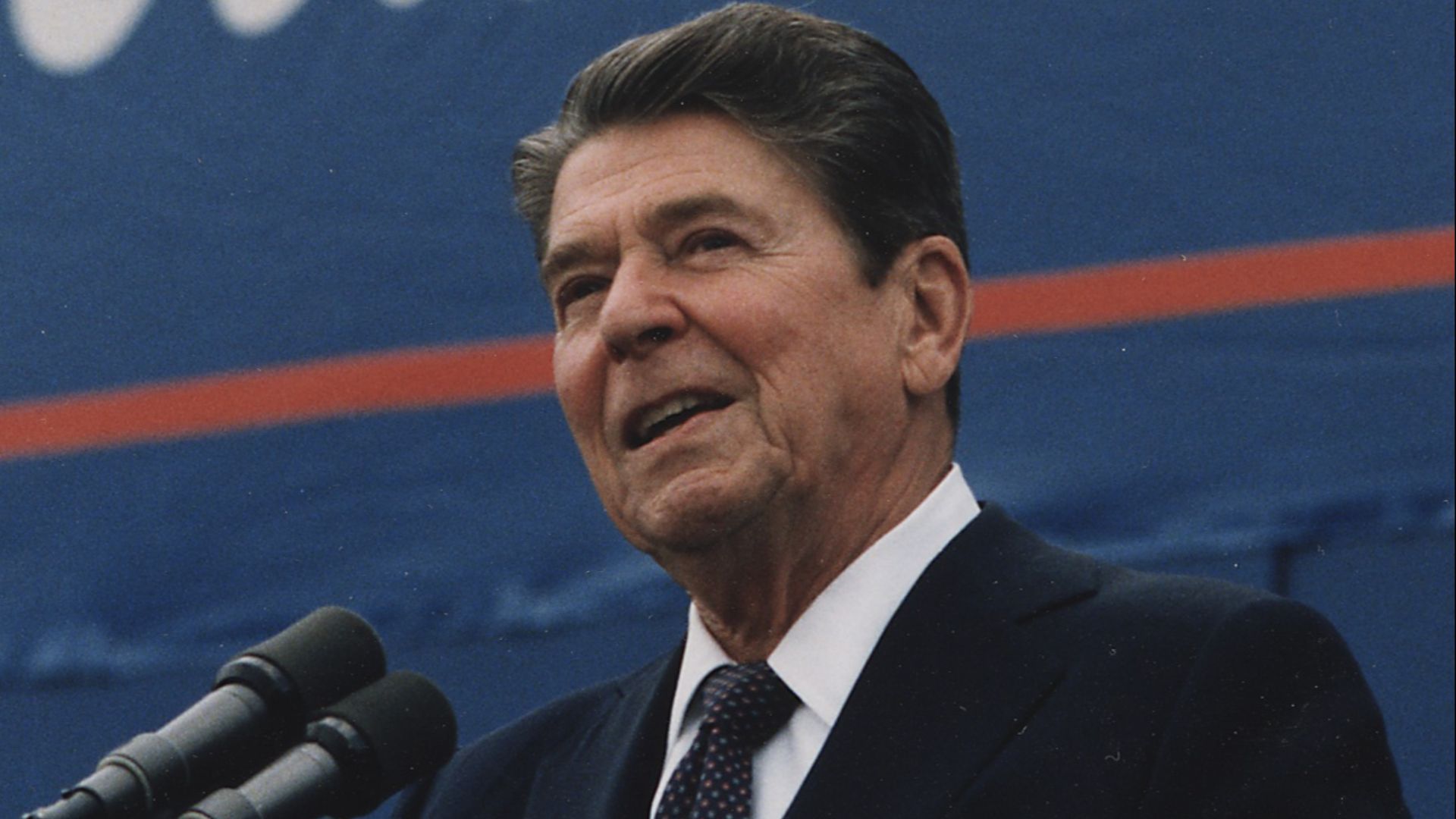 Unknown authorUnknown author or not provided, Wikimedia Commons
Unknown authorUnknown author or not provided, Wikimedia Commons
22. A Man Can Dream!
One of Reagan’s biggest, and most controversial, plans was the Strategic Defense Initiative. The SDI was intended to protect the US from nuclear weapons and would involve space-based missiles. The project was dubbed “Star Wars” by contemporaries and historians alike, partly because the plan was in the realm of science fiction, based on the available technology. If only Reagan had been born a long time ago, in a galaxy far, far away…
23. Another Scandal?!
The Department of Housing and Urban Development came under fire when its secretary, Samuel Pierce, was found to have arranged for Reagan supporters to have priority when it came to low-income housing bids. After the rigging was discovered, the subsequent scandal led to sixteen convictions.
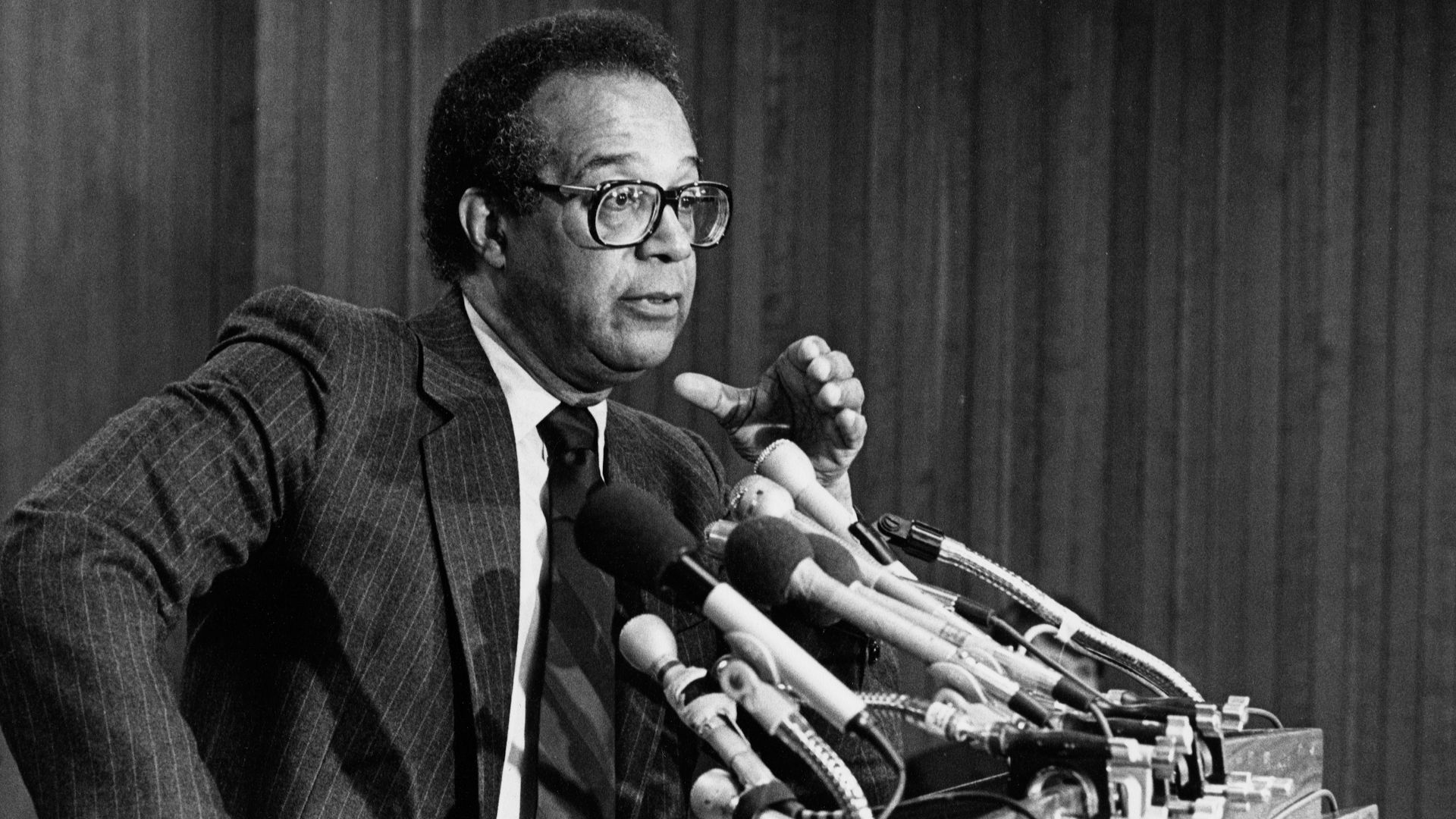 David Valdez, Wikimedia Commons
David Valdez, Wikimedia Commons
24. Did He Also Have a Wrench in the Library?
During the Reagan presidency, Lt. Col. Oliver North admitted responsibility for weapons being illegally sold to Iran despite an arms embargo placed on the country. The aim was to continue financing the Contras in Nicaragua as they fought to topple the government there. It became known as the Iran-Contra scandal.
 Air Combat Command United States Air Force from Hampton, Va., USA, Wikimedia Commons
Air Combat Command United States Air Force from Hampton, Va., USA, Wikimedia Commons
25. Presidential Informant
As President of the Screen Actors Guild, Reagan might have been in a conflicted position to start applying his own personal politics. That didn’t stop him from actively joining in the witch hunt against Communists and other left-wing people whose careers were destroyed because of their personal politics. Reagan even became an FBI informant, naming colleagues as having Communist sympathies.
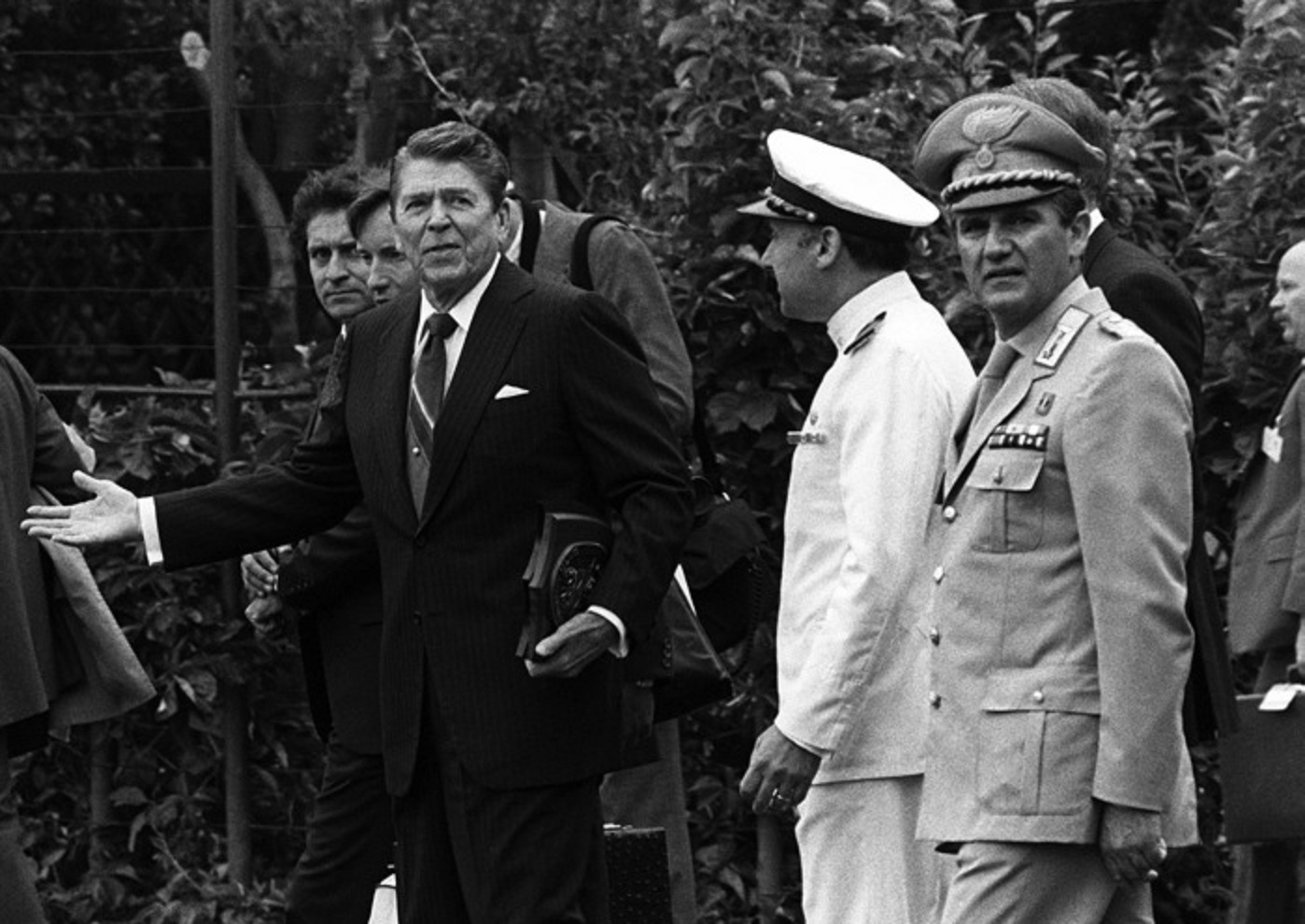 The U.S. National Archives, Picryl
The U.S. National Archives, Picryl
26. George Bailey Wept
Another scandal which erupted during the Reagan Administration was the Savings & Loan crisis. The government’s deregulations also included the thousands of S&L associations which issued loans that the banks thought too risky. To make a very long and complicated story short, over a third of all S&L associations failed between 1986 and 1995. The cost to taxpayers was around $125 billion. Luckily, the Americans learned from their mistake, and there was never an issue with bad loans and deregulated systems ever again. Right?
27. He Seems Misunderstood
During his time as Governor of California, Reagan was asked by several people to issue a pardon to Spade Cooley. Cooley was a well-known country musician of the time who, in 1961, had beaten his wife to death in a jealous rage, leading to his imprisonment. Fans and friends alike wanted him pardoned, proving that celebrities have always enjoyed a different kind of justice system than the rest of us. Reagan agreed to pardon Cooley in 1969, but Cooley had died of a heart attack before the pardon could be carried out. Oh well.
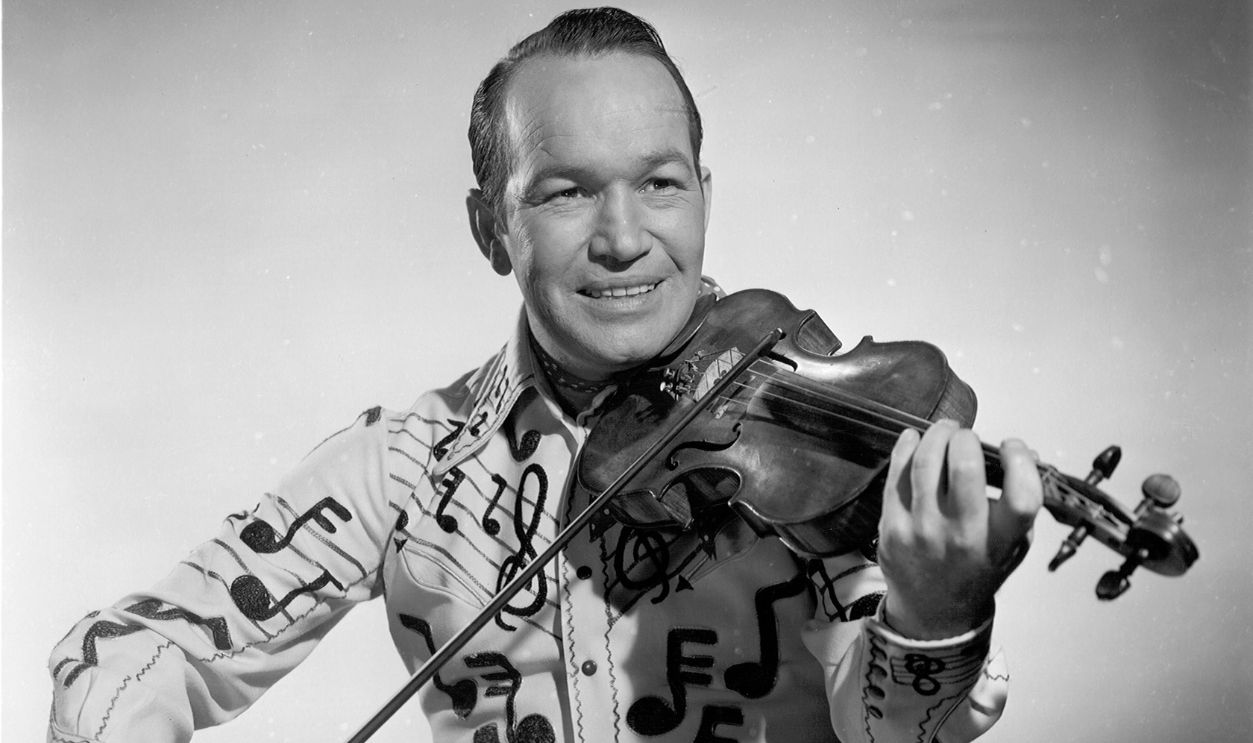 Michael Ochs Archives, Getty Images
Michael Ochs Archives, Getty Images
28. Big Spender
For all Reagan’s talk about balancing budgets and cutting taxes, this led to a serious problem. By the time Reagan finished his two terms, the United States’ debt increased from $994 billion to a whopping $2.9 trillion. Maybe should have spent a little less on all those new weapons?
29. I’ll Fix That!
To be fair to Reagan, he did recognize that all his spending was creating a serious debt, and he couldn’t go back on his word cutting taxes to the rich. So, he decided to raise taxes on the middle class and lower classes instead. Unemployment rose from 7.5% to 10.8% in 1982—the highest percentage since the Great Depression. True, the number did go down by the time Reagan finished his two terms, but the jobs that replaced those lost were often low-paid and didn’t do much to help against the raised taxes on the people working said jobs.
 Reagan White House Photographs, Wikimedia Commons
Reagan White House Photographs, Wikimedia Commons
30. Give These Guys Money, They Can Use it Wisely
During the Soviet-Afghan war, President Jimmy Carter had given limited support to the Afghans. Reagan and the CIA changed that policy by sending a total of $3 billion to Afghanistan, which still ranks as the biggest CIA covert operation ever completed.
31. The Ironic Elephant in the Room
Although Reagan consistently ran on a platform promoting family values, drawing Christian voters to him for his respect of the sanctity of marriage, he was the first US President to have been divorced.
 Karl Schumacher, Wikimedia Commons
Karl Schumacher, Wikimedia Commons
32. What Are You Rascals Up To?!
Statistically, Reagan presided over one of the most corrupt administrations in recent US history. A total of 138 people were investigated for their involvement in some sort of scandal. Of those people, 21 were convicted, and while one could argue that that’s a low number, it beats the Nixon administration’s eight names and just one from the Clinton administration.
 White House Photographic Office, Wikimedia Commons
White House Photographic Office, Wikimedia Commons
33. War on the Brain
In 1982, Reagan declared “today, in virtually every measure of military power, the Soviet Union enjoys a decisive advantage.” This lie ignored the fact that the United States was the one who was ahead, not the Soviets. However, this allowed for Reagan to increase military spending. By 1985, the military budget was over $100 billion higher than it had been under Carter—who had also increased the military budget.
 Reagan White House Photographs, Wikimedia Commons
Reagan White House Photographs, Wikimedia Commons
34. A New Plague
In 1981, the first cases of HIV and AIDS were reported, and by 1983, the number had already swelled to over 1,000, half of which had proved fatal. Despite this fact, Reagan didn’t even mention the word “AIDS” in a public address until September 17, 1985, by which time more than 20,000 Americans had died from it. One might say he was a bit late to the party.
 Reagan White House Photographs, Wikimedia Commons
Reagan White House Photographs, Wikimedia Commons
35. On Another Note, It’s Opposite Day
Under pressure from various LGBTQ groups and other activists trying to bring attention to the AIDS crisis, Reagan vowed to make combating the disease a “top priority.” Instead, his proposed budget for 1986 contained an 11% reduction in spending on the research and the prevention of AIDS. By the end of 1986, nearly 24,600 people had died of AIDS.
36. Not the Children!
One reason why the response of Reagan and his administration was so slow was because many assumed that AIDS was simply a disease which only affected LGBTQ people. However, when an Indiana teenager named Ryan White showed that anyone could get AIDS (White got the disease through an infected blood transfusion), and when Reagan’s personal friend, actor Rock Hudson, admitted that he was HIV positive, the administration finally begin to address what was happening.
37. And the First Amendment?
As Governor of California, Reagan vowed to crack down on student protests against the Vietnam War which were becoming prominent on the campuses of California’s colleges. Berkeley, in particular, got on Reagan’s nerves, describing it as "a haven for communist sympathizers, protesters, and sex deviants.”
38. Well That’s an Overreaction…
On May 15, 1969, an anti-war rally was planned for the People’s Park and Reagan sent police forces to fence it off. The confrontation turned into a riot, in which both sides resorted to violence, although only one side had the use of shotguns. The event came to be known as “Bloody Thursday” due to the 128 Berkeley residents who went to local hospitals for “head trauma, shotgun wounds, and other serious injuries inflicted by police.” One man, Alan Blanchard, was permanently blinded by a load of birdshot, and a student named James Rector was killed by the police gunfire. And that’s not even counting the ones who stayed away from the hospital to avoid a potential arrest. After the incident, Reagan sent the National Guard into Berkeley because of what happened.
 Ronald Reagan Presidential Library, Wikimedia Commons
Ronald Reagan Presidential Library, Wikimedia Commons
39. Well That’s Harsh
Given that someone died during the protest at the park, Reagan might have been sympathetic, at least for the press, to the family who lost a son. However, even a year after the death of James Rector, Reagan was unapologetic of the choices he’d made that day, and boasted "If it takes a bloodbath, let's get it over with. No more appeasement.”
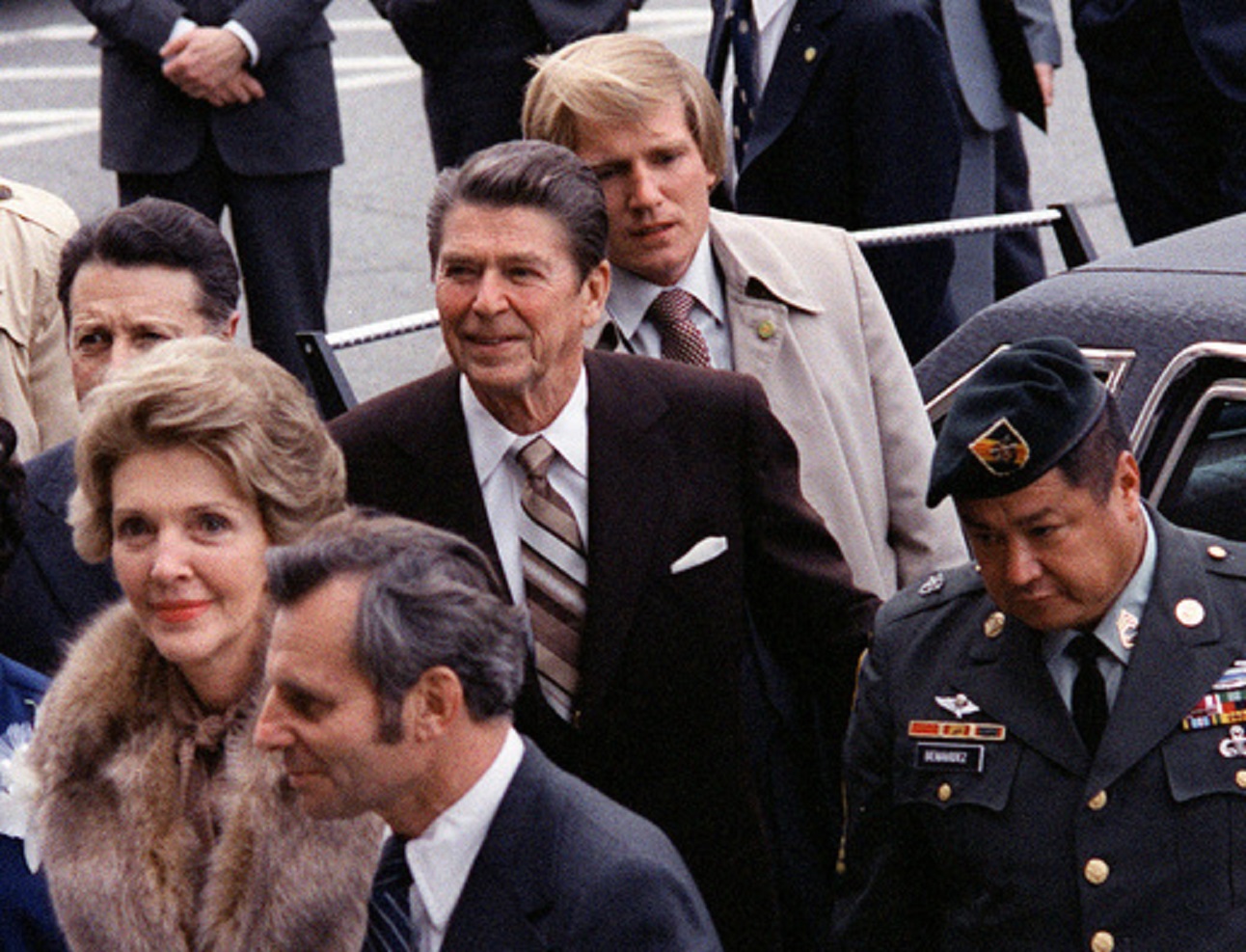 The U.S. National Archives, Picryl
The U.S. National Archives, Picryl
40. Free at Last? Not on My Watch!
During the 1960s, Reagan put his Democrat roots behind him as quickly as possible, and this was never more clear than when it came to the various Civil Rights legislations that went through during the decade, including the Fair Housing Act of 1968, the Equal Voting Act of 1965, and the Civil Rights Act of 1964. All of these acts were aimed to end legalized racism in American society, and Reagan proudly voiced his opposition to all of them. Luckily, they were passed anyway.
41. Who Cares About That Man?
Reagan didn’t change his tune when it came to opposing Civil Rights as the POTUS. Reagan slashed funding to the Equal Employment Opportunity Commission—those funds for his Star Wars program had to come from somewhere. He was even against the creation of Martin Luther King Jr. Day, and only signed it into law after an overwhelming majority of congress and the senate voted in favor of the holiday.
42. What Would Freud Say?
Back when he was still an actor in Hollywood, a 39-year-old Reagan allegedly seduced a then-18-year-old Piper Laurie when they starred in the film Louisa. Laurie was playing his onscreen daughter at the time when he took an interest in her.
Sources: 1, 2, 3, 4, 5, 6, 7, 8, 9, 10, 11, 12, 13, 14, 15, 16, 17, 18, 19, 20, 21, 22, 23, 24, 25, 26, 27, 28, 29

